Henry Loftus Wisker & Penal Transportation
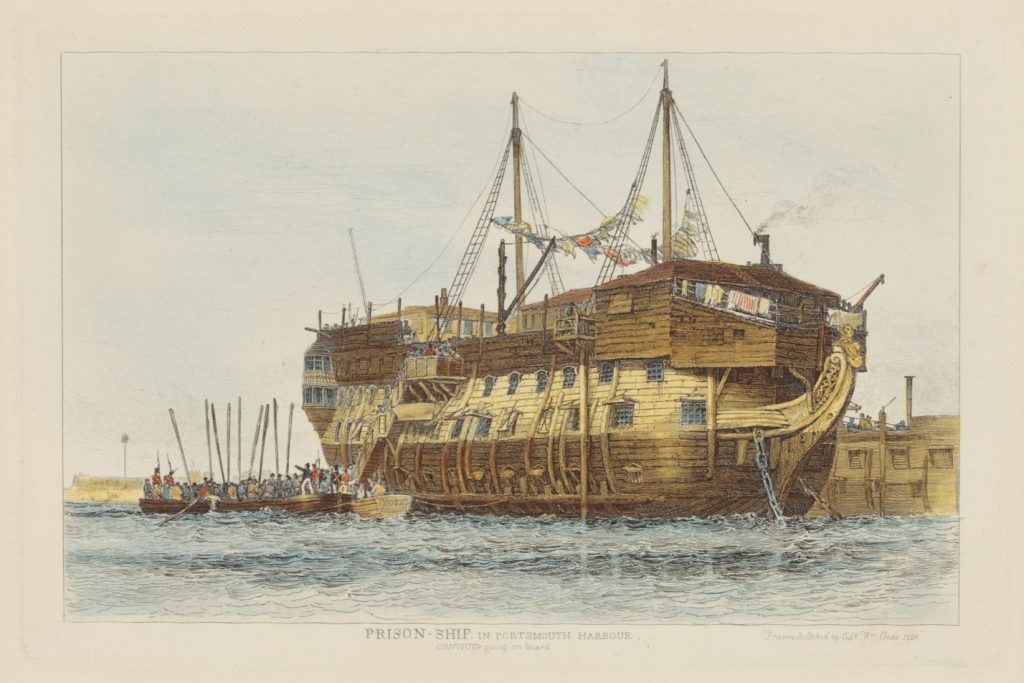
Today, a convict ancestor is a matter of pride for Australians. It provides a connection to the earliest pioneer (and prison colony) days of a nascent Australia! Between 1788-1868, 162,000 convicts were transported to Australia. In 1841 our 1st cousin 5x removed, Henry Loftus Wisker (1805-?), became our first ancestor to be sentenced to transportation for seven years!
Penal transportation was the relocation of convicted criminals, or other persons regarded as undesirable, to specifically established penal colonies. In 1841 the most likely destination for British convicts was Van Diemen’s Land, aka Tasmania. While the prisoners may have been released once the sentences were served, they generally did not have the resources to return home.
Our cousin, Henry, was born in Spurriergate, York, to Elizabeth Rigg (1777-1854) & John Wisker (1774-1822), an optician who had taken over the Golden Spectacles business from his parents.
Henry’s elder brother, named Matthias after his grandfather, was also an optician, becoming the third generation to run the family business, Golden Spectacles. Henry’s sister Elizabeth married a successful York businessman, George Peacock Bainbridge, who ran a woolen drapery business on Ousegate. And his younger brother, Thomas Rigg Wisker, was a surgeon and became a coroner in York, living with his widowed mother in Castlegate.
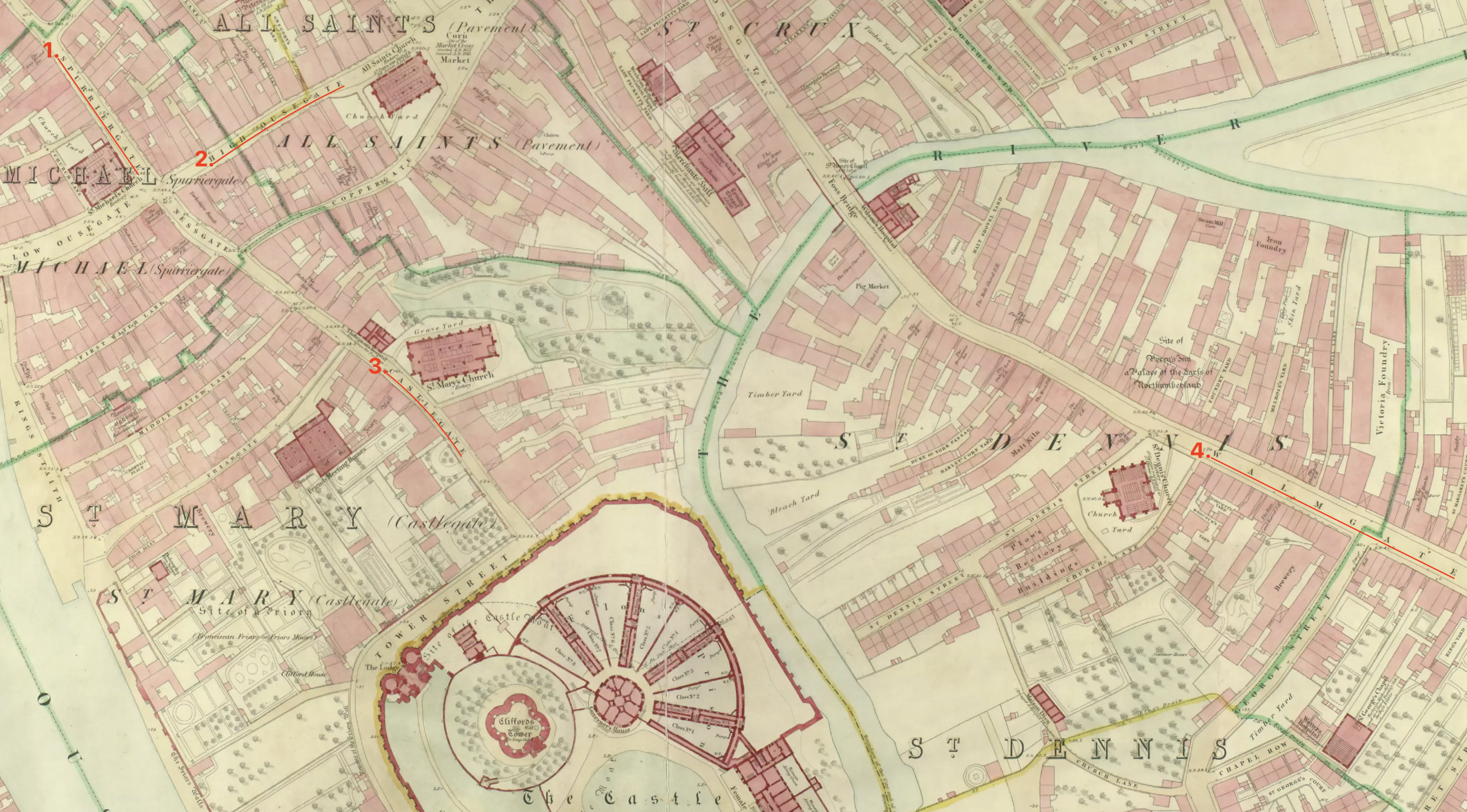
Coming from a well respected family, Henry had been advised by his lawyer to plead guilty and hope for leniency. As a first offense, Henry was shocked when the judge threw the book at him with a sentence to transportation for seven years!
Looking into Henry Loftus Wisker’s history, this purportedly respectable gentleman may have had one or more skeletons in the closet. Scrolling back eight years before his arrest… In 1833 Henry had married the daughter of a Pocklington Attorney at Law but the couple separated within six months, even before the birth of their daughter.
In parallel to the failed marriage, Henry’s bacon, cheese, and butter, business in Walmgate, York, went bankrupt. He had been out of business for 18 months before being summoned to insolvency court in the Guildhall, York. Henry admitted that he was being supported by his brother and all his furniture belonged to his sister-in-law — with whom his wife and daughter were residing. He was ordered to be discharged, freeing him from any debts that were included in the bankruptcy. Unlike his siblings Henry had failed at his own business and also in employment for others.
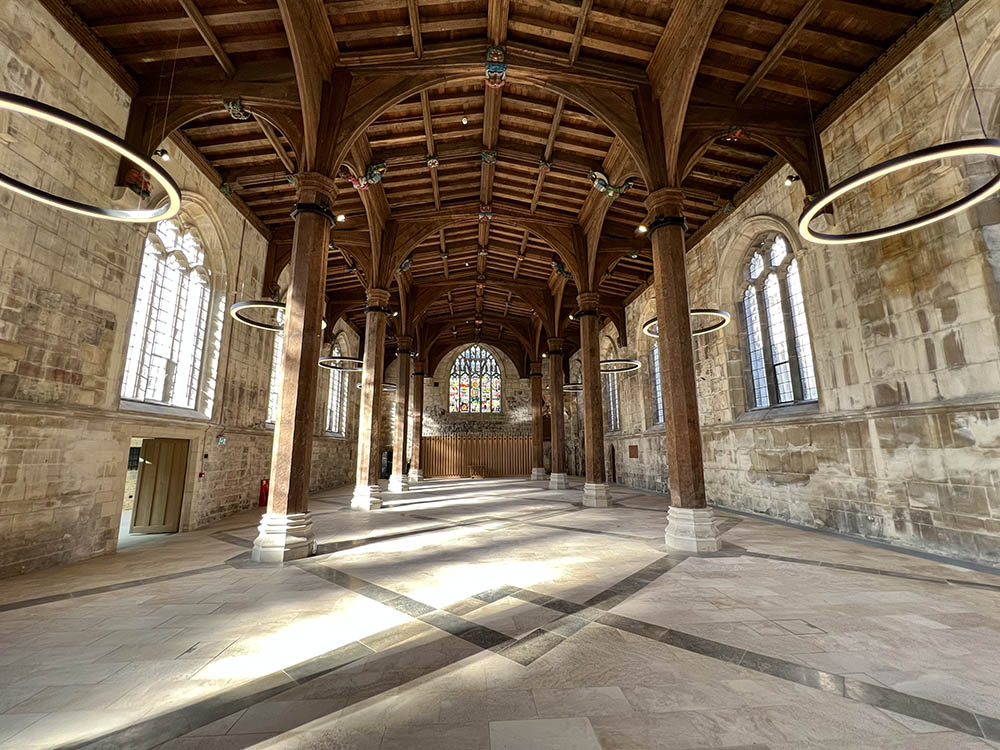

HARRIET TITTERTON. Snow-hill, Feb. 16, 1839.
Aris’s Birmingham Gazette – Monday 18 February 1839
Extraordinarily, Titterton Varnish Manufacturers took out a nationwide notice to prevent their previous employee, Henry, from collecting their debts. By the time of his Old Bailey court appearance in 1841 Henry was presenting himself as a sailor, although no other records exist. Henry’s brother described him as an excellent scholar but that is not reflected in the prison records which list his reading and writing skills as imperfect. In fact his letters written from prison are not in his own hand.

This is the court transcript from Morning Herald (London), Friday 15th Oct 1841, describing in detail the two counts of forgery, or obtaining money under false pretenses, of which Henry was accused.
GUILDHALL. Yesterday Frederick Roff and Henry Loftus Wisker were brought up in the custody of Roe, the City officer, charged with uttering two forged orders or requests for the payment of money.
Roff was examined separately on Tuesday last before Mr. Alderman T. Wood, having been apprehended that morning by Roe at the premises of Mr Block, a fridge manufacturer, in Newgate Street.
Mr Block stated that on the 24th of September he received a letter by post from York, purporting to be written by Mr G Bainbridge, a customer, requesting him to pay for him a sum of £20 to William Bainbridge. The prisoner Roff called subsequently with a sort of counterpart to this letter, notifying that the £20 might be received at Mr Block’s. Witness’s clerk paid him the amount. IT was subsequently discovered that the letters were forgeries. On the 9th inst. another letter of the same kind was posted at York, requesting a further sum of £12 to be paid to William Bainbridge and debited to Mr G Bainbirdge. On the 11th Roff brought the advise addressed to William Bainbridge with what purported to be William Bainbridge’s receipt for £12, written on a sixpenny stamp. He then sent for Roe, the officer, and paid the prisoner, but detained him till the officer arrived.
Mr G Bainbridge, of York, said neither of the letters were written by him or his order. He knew the handwriting to be that of Henry Loftus Wisker. He also knew a Mr William Bainbridge, a hatter, in London, in favour of whom these orders purported to be written.
Roff stated that he was employed to present the letters by Wisker, and had no suspicion that he was doing wrong. He exhibited a letter which showed that he was to remit the £12 to Wisker, at the King’s Head, at Margate.
He was remanded, and, at the suggestion of Roe, to his friend at Margate to announce that he would come to him, and Roe set off to apprehend the party who might claim the letter on it’s delivery by the postman. On his way, Roe stopped at an inn at Canterbury, and observed a person walk into an opposite room answering pretty closely the description of the man he was in search of. Roe called in the person suspected proved to be the identical Mr Wisker who they were going to Margate to apprehend. Wisker, anticipating such a move, had shifted his quarters to Canterbury, directing the coachman to call at the inn at Margate for any letters.
The circumstances having been briefly stated to Mr Alderman Farncomb, Roe, the officer, applied for an adjournment, on the ground that Mr Bainbridge, the chief witness, was unable to attend.
Mr. Alderman Farncomb asked Wisker if he could show why he should not be remanded?
Wisker replied that he did not object to it.
Roff, as he had spoken the truth, and seemed to have been made a dupe, was discharged, and Wisker was remanded.
Morning Herald London – Friday 15th Oct 1841

Henry had been held at Newgate Prison during the trial at the Old Bailey, London. Having plead guilty, the criminal was sentenced and transferred to the Hulks at Portsmouth — a series of aging demilitarized warships of the line moored offshore to serve as holding pens for convicts awaiting transportation.


UK, Criminal Records, 1780-1871for Henry Whisker, 4 Nov 1841, Transfer from Newgate Prison in London to Prison Hulk, HMS Leviathan, moored off Portsmouth, to await Transportation.
Henry was transferred to the HMS Leviathan. In a former the life the ship had served with Admiral Nelson at the Battle of Trafalgar. Now, stripped of all naval fittings, with only two masts remaining to serve as clothes props, and a shed erected on her deck, any shred of naval dignity was lost. The Hulk was resident to 300 prisoners, managed by a profit making company, working outside of the British penitentiary system.
… the cry of “Lags away” warned those who were transported that the time had now arrived for their removal to the hulk; and shortly afterwards those who … had been respited from death … were placed in two large vans, strongly ironed, handcuffed and chained together, as well as to the van, which drove off at a rapid rate. [After an overnight journey the van made the Portsmouth dockyard and the convicts] were permitted to alight on a wooden wharf, outside of which lay the gloomy bulk of the old Leviathan.
The Adventures of Ralph Rashleigh, A Penile Exile in Australia, 1825-1844
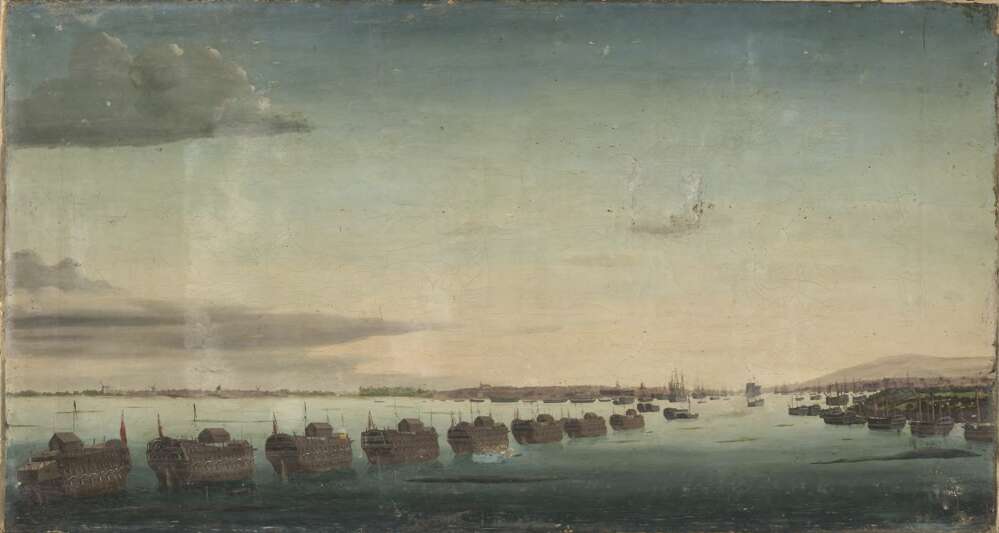
Many prison Hulks were moored at Portsmouth as well as Woolwich, Gibraltar, and Bermuda. Due to the number of complaints of disease, brutality, starvation rations, and hard labour, the National Archives is rife with inquiries and reports made by the government — to limited effect. They do provide us with the vivid details of life aboard the Hulks.
“New prisoners are made to pass along the quarter deck every morning with their hats off, for a fortnight after their arrival, in the presence of the officers and guards, that their features, gait, etc, may be made familiar to them, in case of any attempting disguise to effect an escape.”
Free Settler or Felon, Prison Hulk Report, 1838
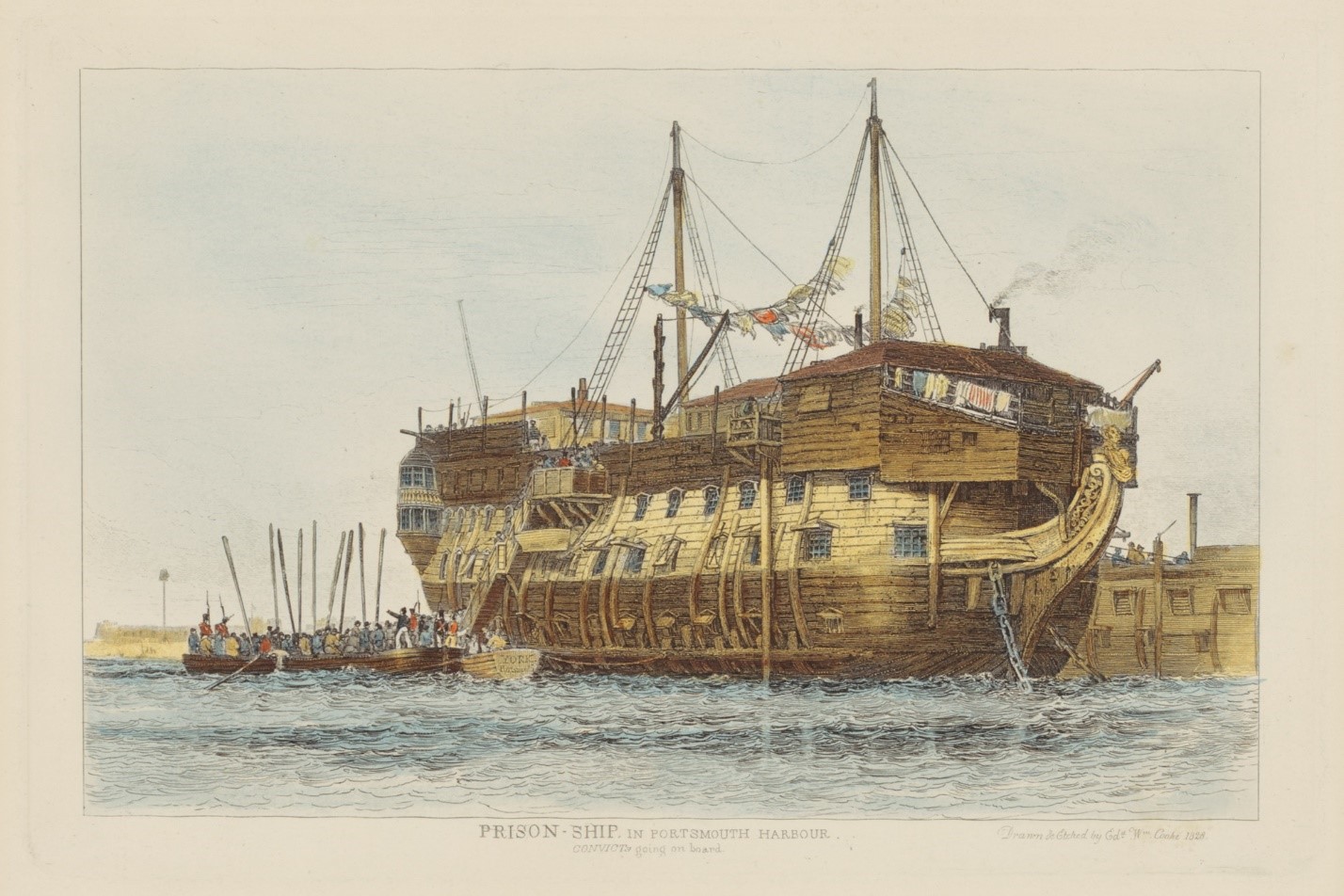
The typical day on the Hulks began with a muster at 5:45am. After breakfast, the convicts proceeded to the dockyards. Their leg irons were checked as they went on shore to work, supervised by the non-convict dockyard workers and first and second mates from theLeviathan. The convicts returned to the ship for the midday meal, and then resumed their labours at the dockyards. At 5:45pm the convicts returned to the ship. At 6:30pm school commences, and at 7:30pm prayers are read in the chapel; after which they are mustered and locked up in their respective wards for the night.
During the day working parties of convicts left the hulks to work on land or in the dockyards, doing things like laying roads, carpentry, construction work and other forms of heavy labour.
‘A floating Hell’: life on early 19th century convict hulks, 1 September 2015, Briony Paxman, The National Archives
The days and months will have passed with monotony, pain, and anguish. The world outside of the Hulks continued without a care. Less than six months later, Henry’s innocent partner in crime, the dupe Frederick Roff, was sentenced to transportation for 14 years, for a separate crime. In December of that same year, Thomas Rigg Wisker, Henry’s younger brother, the York surgeon, died suddenly aged 36.
As the two year mark of imprisonment approached Henry began his plea for a pardon, as this would be earliest opportunity for consideration of clemency. The Hulk Leviathan was due to be decommissioned and, those prisoners not pardoned, were scheduled to be transported to Australia. With this impetus Henry began his plea for pardon in earnest.
Engaging the services of William Garwood, Solicitors, in Castlegate, York, next door to his mother’s home, he drafted a plea to J W Lowther Esq. 2nd Baronet & MP (Member of Parliament) for York. The strategy was to plead with the Home Secretary as an initial request in November 1841 had fallen on deaf ears.
I am sanguine in my anticipation that your decision will be favourable to me, from your commanding position in society should you condescend, to interest yourself in my behalf. I have everything to hope, your influence alone, I feel convinced would be sufficient to deliver me from the depth of wretchedness, in which I am plunged, and to restore me to my Friends, & Society, my gratitude, to you, Sir, in the event of your interference, in my behalf can be appreciated only by those who have been similarly situated and whether your philanthropic exertions, be successful or not, rely on it that no cause shall ever be given you in my future career, to regret any steps you may be pleased to take in my favour.
Extract from Plea for Pardon by Henry Loftus Wisker, C M Ship Leviathan, October 3rd 1843
Despite the decommissioning of the Leviathan, Henry was not transported but instead transferred to the HMS Stirling Castle, 31 October 1844, a 74-gun third-rate ship of the line, launched in 1811.
As his third year of imprisonment came and went, Henry’s plea leveraged the family tragedy: his poor widowed mother; the death of his younger brother; and his own ill-health, caused by the conditions of his own confinement; along with a vow of contrition.
-moored-at-plymouth-(+-a-prison-hulk;-pair).jpg)
I beg to state that my sole reason for troubling you at this time, especially after receiving a communication so extremely satisfactory as your last, is my delicate state of health, [sic] recasioned by the dreadful complaint (that of spasmodic stricture) under which I am suffering the most excruciating pains both by day & night, & which can only be removed by undergoing an operation. Very lately my life was at stake by the total suppression of my water for 12 hours__ during which kind I endured the greatest agony.
It is on this account that I particularly solicit your assistance, for I know not how soon I may have another attack, and it would be extremely hard for my life to be sacrificed here at the eleventh hour, when I have completed 2 months over the stipulated time that men sentenced for 7 yrs are expected to serve.
Extract from letter to Home Office, H L Wisker, HMS Stirling Castle, June 12th 1845
Henry’s final plea for pardon included a letter from his mother, signatures from prominent members of his York Parish, local businessmen including his brother Matthias Wisker, the optician, members of the clergy, and his MP, but not his brother-in-law, upon whom the crime was committed. Additionally Henry drafted a statement of facts of the crime, including admittance of guilt and justification of his actions through inebriety.
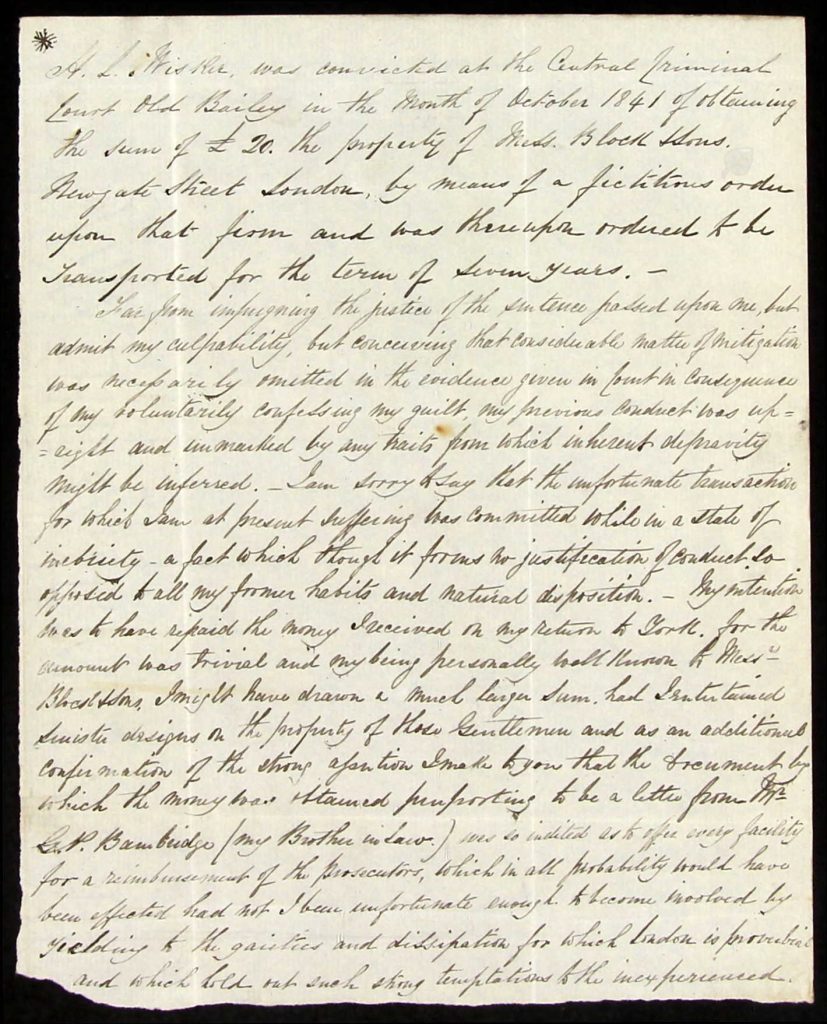
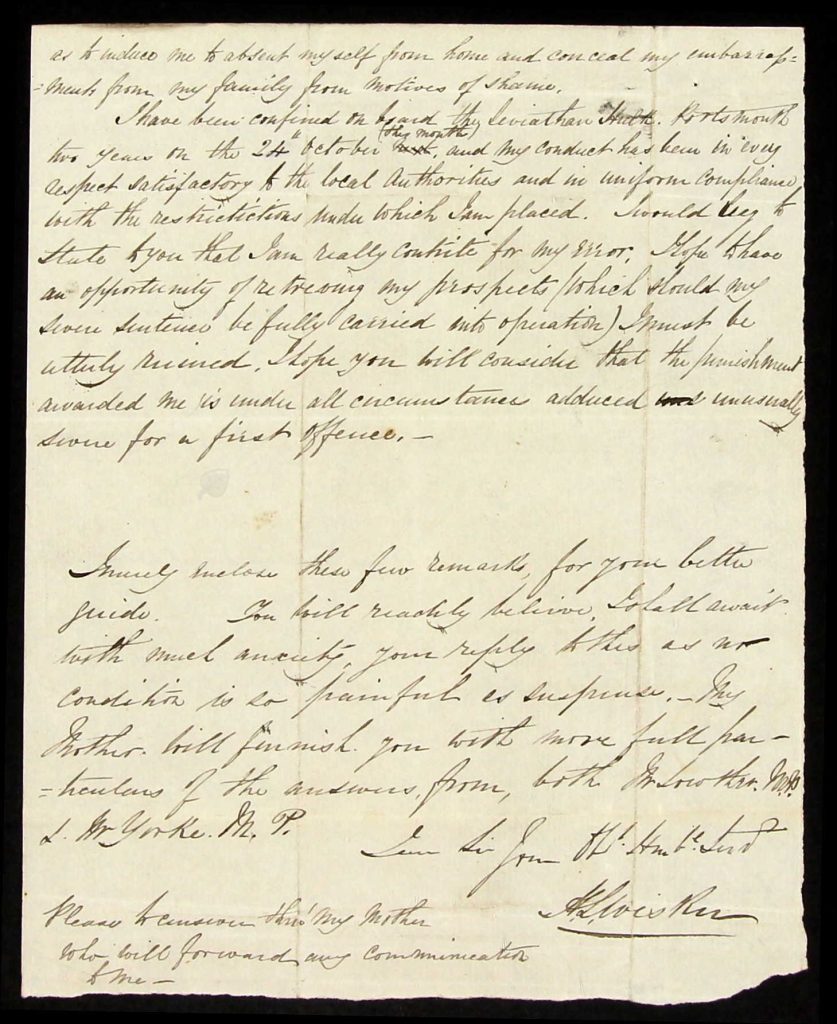
… Far from impugning the justice of the sentence passed upon me, but admit my culpability, but… omitted in the evidence given in court in consequence of my voluntarily confessing my guilt, any previous conduct was upright and unmarked by any traits from which inherent depravity might be inferred. _ I am sorry & say that the unfortunate transaction for which I am at present suffering was committed while in a state of inebriety _ a fact which though it forms no justification of conduct so opposed to all my former habits and natural disposition. _ My intention was to have repaid the money I received on my return to York for the amount was trivial and my being personally well known to Messrs Block & Sons, I might have drawn a much larger sum had I entertained sinister designs on the property of those Gentlemen and… the document by which the money was obtained purporting to be a letter from Mr G. P. Bainbridge (my Brother in Law) was… to offer every facility for a reimbursement of the prosecutors, which in all probability would have been effected had not I been unfortunate enough to become involved by yielding to the gaieties and dissipation for which London is proverbial and which held out such strong temptations to the inexperienced as to induce me to absent myself from home and conceal my embarrassments from my family from motives of shame.
I have been confined on board the Leviathan Hulk.. and my conduct has been in every respect satisfactory to the local authorities and in uniform compliance with the restrictions under which I am placed. I would like to state to you that I am really contrite for my error, I hope I have an opportunity of retrieving my prospects (which should my severe sentence be fully carried into operation) I must be utterly ruined, I hope you will consider that the punishment awarded me is under all circumstances adduced unusually severe for a first offense.__
Henry Loftus Wisker, HMS Leviathan, Portsmouth
After 3 years, 8 months, and 14 days, Henry Loftus Wisker received his Free Pardon with Her Majesty’s Mercy from the Home Secretary, Sir JRG Graham, 2nd Baronet. Released from the Prison Hulks at Portsmouth, he had served over half his sentence and almost twice the duration of similar convicts.


Pardon 28 July 1845, UK, Criminal Records, 1780-1871for Hy Loftus Wisker
Sadly for the family, we failed to find our first Australian criminal cousin. However, mysteries still remain as Henry Loftus Wisker fails to appear in any official records after his release from prison. His mother Elizabeth Wisker né Rigg remained in York and passed away, aged 78, in October 1854 in Feasegate. More research is required to determine whether Henry led a quiet life in York, died as a result of illnesses acquired in custody, or emigrated in an attempt to hide from the soiled family reputation. Watch this space…
Family Tree
- Matthias WISKER (1742-1829) & Elizabeth JACKSON (1750-1811)
- John Wisker (1774-1822) & Elizabeth Rigg (1777-1854)
- John-Thomas Wisker (1799-1801)
- Matthias Wisker (1802-1859)
- Elizabeth Wisker (1802-1872)
- Henry Loftus Wisker (1805-?)
- Thomas Rigg Wisker (1806-1842)
- Robert Wisker (1776-1845)
- Elizabeth Wisker (1777-?)
- Mary Wisker (1780-?)
- Ann Wisker (1782-1785)
- Jane Wisker (1784-?)
- Matthias Wisker (1786-1788)
- William Wisker (1787-1787)
- Matthias WISKER (1790-1873) & Hannah DOBSON (1792-1859)
- Sarah WISKER (1821-1905) & William NICHOLS (1830-1903)
- Hannah NICHOLS (1855-1925) & James BAKER (1843-1914)
- John William Baker (1875-1958)
- Sarah Emily ‘Sallie’ Baker (1877-1971)
- Thomas Henry Baker (1879-1954)
- Elizabeth Ann ‘Cissie’ Baker (1880-1961)
- Maria Louisa Baker (1883-1960)
- Mary Hannah Baker (1886-1886)
- Amy Ellen Baker (1887-1964)
- Ada Mary Baker (1889-1891)
- Grace Hannah ‘Daisy’ Baker (1890-1971)
- Clara Eva BAKER (1893-1962) & William THOMPSON (1891-1964)
- Winifred May THOMPSON (1920-1977) & Charles Reginald BAINBRIDGE (1915-1994)
- Our direct line…
- David William Thompson (1930-2015)
- Winifred May THOMPSON (1920-1977) & Charles Reginald BAINBRIDGE (1915-1994)
- Hannah NICHOLS (1855-1925) & James BAKER (1843-1914)
- John Wisker (1823-1901)
- Elizabeth Wisker (1824-1888)
- William Wisker (1830-1835)
- Margaret Wisker (1831-?)
- Mary Wisker (1832-1852)
- Jane Wisker (1834-1871)
- Sarah WISKER (1821-1905) & William NICHOLS (1830-1903)
- Henry L Wisker (1791-1791)
- Isabella Wisker (1792-1829)
- John Wisker (1774-1822) & Elizabeth Rigg (1777-1854)
Transcripts of UK Prison Records (1841-1845)
As I have taken the time to transcribe the UK Prison Records (1841-1845) of Henry Loftus Wisker, I decided to include the full transcripts below with all their verbosity and emotional flourishes. We cannot be sure but I suspect the scribe was being paid by the word or the page as these documents may have been templates and just the individuals details switched out as a appropriate. Henry’s imperfect hand writing can be seen in a postscript on the one of the documents below.
GUILDHALL: Henry Loftus Wisker, a young man of respectable appearance was charged with forging two requests for the payment of money. The evidence was nearly the same as had been adduced on a previous day against Frederick Roffs, who was discharged as having been employed by the prisoner to deliver the letters and receive the cash, without being cognizant of the forgery. He was fully committed for trial.
The Morning Chronicle 16 Oct 1841
Frederick Roff said he became acquainted with the prisoner at a public house. Prisoner (Wisker) said he did not like to go to Mr Block’s, on account of a family quarrel, and witness undertook without suspicion to obtain the money for him.
Roe, the City officer, produced a seal he found on the prisoner, which proved to be the one he was used to seal the first letter from York. The Prisoner was committed for Trial Morning Advertiser – Saturday 16 October 1841

J.H. Capper Esq.} To receive the above 4 Nov 1841
UK, Criminal Records, 1780-1871for Henry Whisker, 4 Nov 1841, Transfer from Newgate Prison in London to Prison Hulk, HMS Leviathan, moored off Portsmouth, to await Transportation.
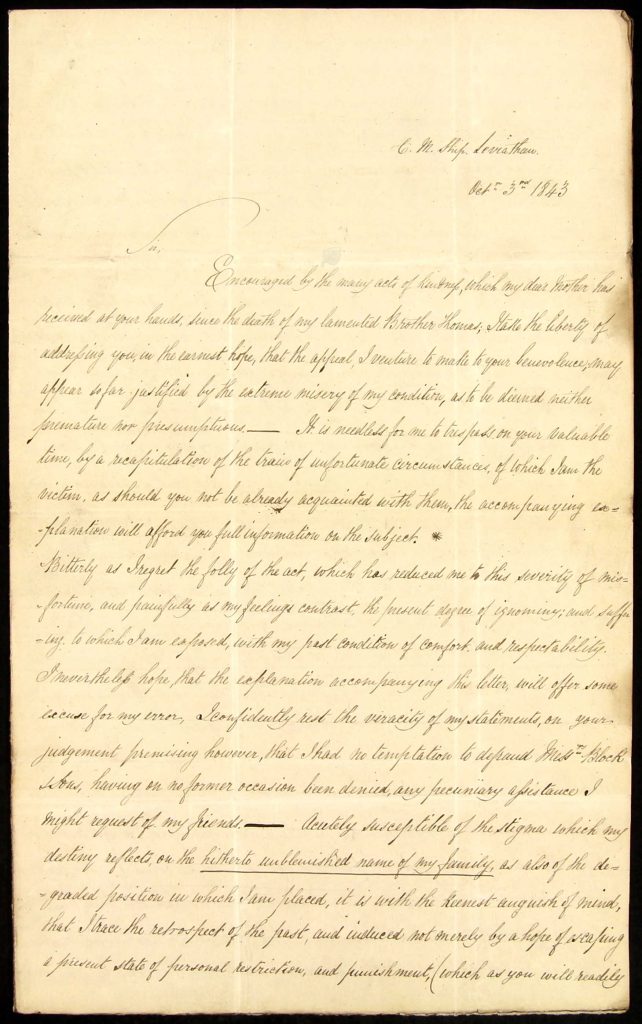
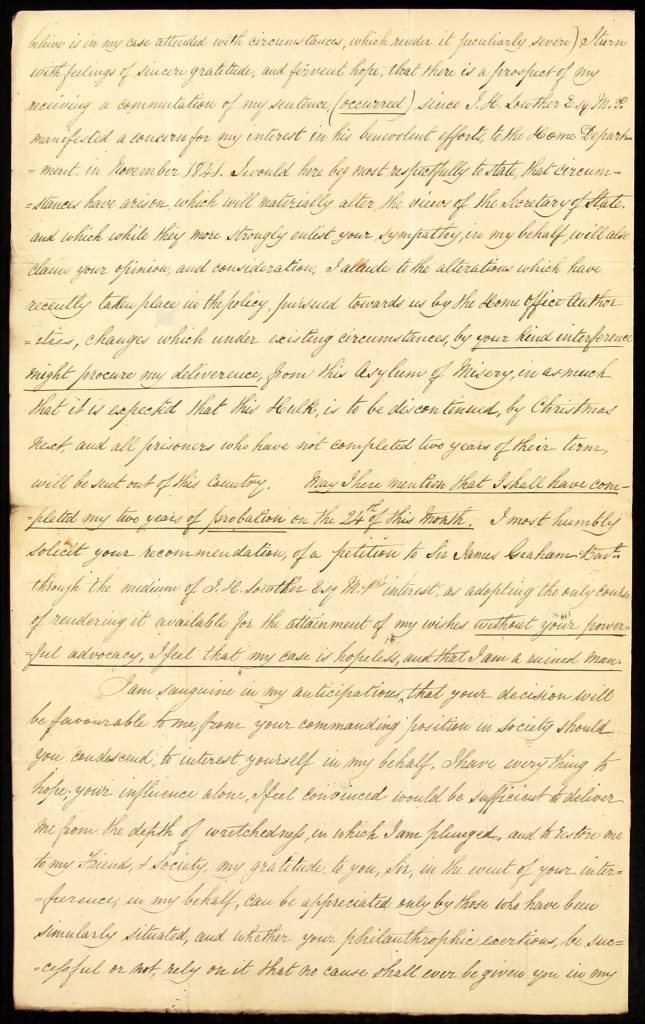
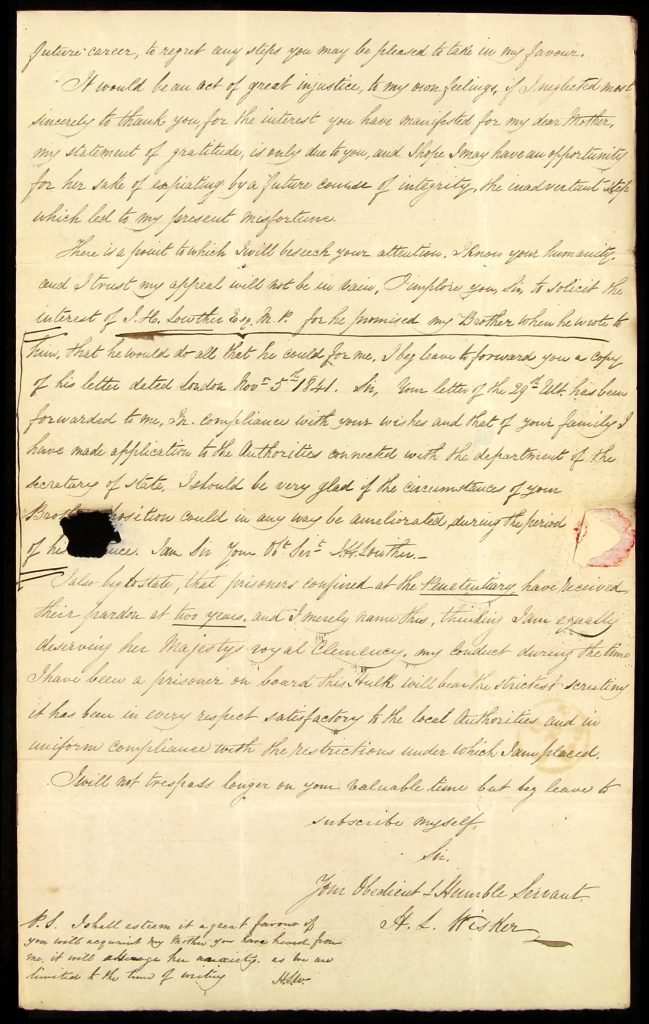
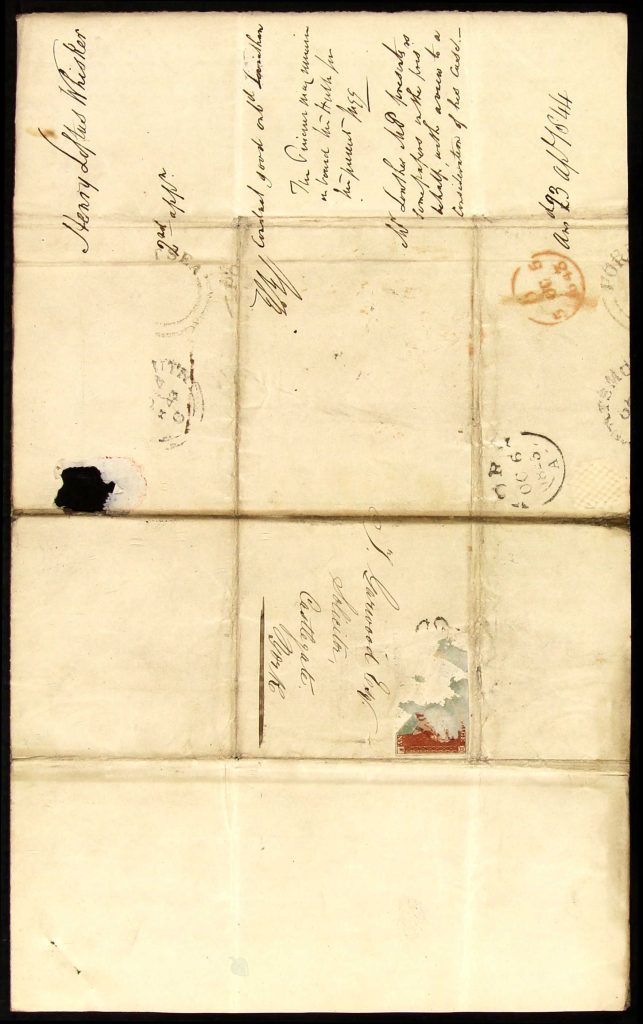
C M Ship Leviathan
Oct 3rd 1843
Sir, Encouraged by the many acts of kindness, which my dear mother has received at your hands, since the death of my lamented Brother Thomas; I take the liberty of addressing you, in the earnest hope, that the appeal, I venture to make to your benevolence; may appear so far justified by the extreme misery of my condition, as to be deemed neither premature nor presumptuous. ___ It is needless for me to trespass on your valuable time, by a recapitulation of the train of unfortunate circumstances, of which I am the victim, as should you not be already acquainted with them, the accompanying explanation will afford you full information on the subject. *
Bitterly as I regret the folly of the act, which has reduced me to this severity of misfortune, and painfully as my feelings contrast the present degree of ignominy; and suffering, to which I am exposed, with my past conditions of comfort, and respectability. I never the less hope, that the explanation accompanying this letter, will offer some excuse for my error, I confidently rest the veracity of my statements, on your judgement premising however, that I had no temptation to defraud Messrs Block & Sons, having on no former occasion been denied any pecuniary assistance I might request of my friends.____ Acutely susceptible of the stigma which my destiny reflects, on the hitherto unblemished name of my family, as also of the degraded position in which I am placed, it is with the keenest anguish of mind, that I trace the retrospect of the past, and induced not merely by a hope of escaping a present state of personal restriction, and punishment, (which as you will readily believe is in my case attended with circumstances, which render it fuculiarly severe) I turn with feelings of sincere gratitude, and fervent hope, that there is a prospect of my receiving a communication of my sentence, (occurred) since J. H. Lowther Esq. M.P. manifested a concern for my interest in his benevolent efforts, to the Home Department, in November 1841. I would here beg most respectfully to state, that circumstances have arisen, which will materially alter the view of the Secretary of State and which while they more strongly enlist your sympathy, in my behalf, will also claim your opinion, and consideration, I allude to the alteration which have recently taken place in the policy, furnished towards us by the Home Office Authorities, changes which under existing circumstances, by your kind interference might procure my deliverance, from this asylum of misery,, in as much that it is expected that this Hulk, is to be discontinued, by Christmas next, and all prisonerrs who have not completed two years of their term, will be sent out of this country. May I here mention that I shall have completed my two years of probation on the 24th of this month. I must humbly solicit your recommendations, of a petitiion to Sir James Graham Bart through the medium of J.H. Lowther Esq. M.P.’s interest, as adopting the only course of rendering it available for the attainment of my wishes without your powerful advocacy, I feel that my case is hopeless, and that I am a ruined man.
I am sanguine in my anticipation that your decision will be favourable to me, from your commanding position in society should you condescend, to interest yourself in my behalf. I have everything to hope, your influence alone, I feel convinced would be sufficient to deliver me from the depth of wretchedness, in which I am plunged, and to restore me to my Friends, & Society, my gratitude, to you, Sir, in the event of your interference, in my behalf can be appreciated only by those who have been similarly situated and whether your philanthropic exertions, be successful or not, rely on it that no cause shall ever be given you in my future career, to regret any steps you may be pleased to take in my favour.
It would be an act of great injustice, to my own feelings, if I neglected most sincerely to thank you, for the interest you have manifested for my dear Mother, my statement of gratitude, is only due to you, and I hope I may have an opportunity for her sake of expiating by a future course of integrity, the inadvertent step which led to my present misfortune.
There is a point to which I will beseech your attention, I know your humanity and I trust my appeal will not be in vain, I implore you, Sir, to solicit the interest of J.H. Lowther Esq. M.P. for he promised my Brother when he wrote to him, that he would do all that he could for me, I beg leave to forward you a copy of his letter dated London Nov 5th 1841.
Sir, Your letter of the 29th Oct, has been forwarded to me, In compliance with your wishes and that of your family I have made application to the Authorities connected with the department of the Secretary of State, I should be very glad of the circumstances of your Brother’s position could in any way be ameliorated, during the period of his ….uce. I am Sir your Obt Sert J.H.Lowther._
I also beg to state, that prisoners confined at the Penitentiary have received their pardon at two years, and I merely name this, thinking I am equally deserving her Majesty’s royal Clemency, my conduct during the time I have been a prisoner on board this Hulk will bear the strictest scrutiny it has been in every respect satisfactory to the local Authorities and in uniform compliance with the restrictions under which I am placed.
I will not trespass longer on your valuable time but beg leaves to subscribe myself, Sir.
Your Obedient & Humble Servant,
H. L. Wisker
P.S. I shall esteem it a great favour if you will acquaint my Mother you have heard from me, it will assuage her anxiety, as we are limited to the hand of writing. H.L.W.
Transcript from envelope…
J Garwood Esq., Solicitor, Castlegate, York
Henry Loftus Whisker
2nd App
– Conduct good onbd Leviathan
– The Prisoner may remain on board his Hulk for his present MGG
– W Lowther MP presents some papers in the pris. behalf with a view to a consideration of his case. _
Ansd 23 April 1844
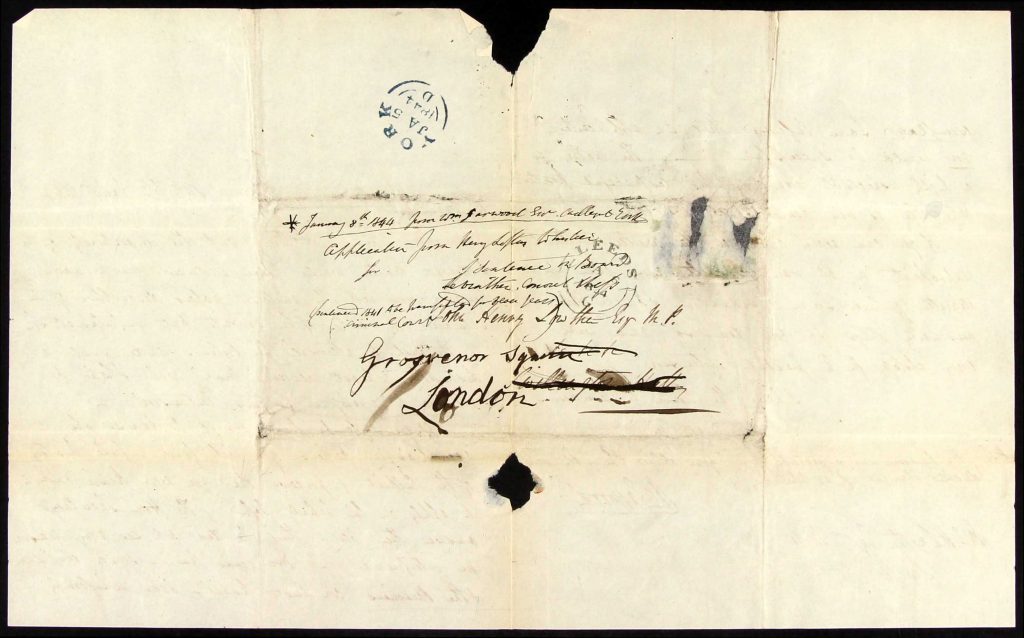
January 8th 1844 from Wm Garwood Snr, Castlegate, York
Application from Henry Loftus Whisker of Sentence onboard Leviathan, ????? ????
Sentenced 1841 ??? ??
??? ??? ??? Henry Lowther Esq. M.P.
Grosvenor Square
London
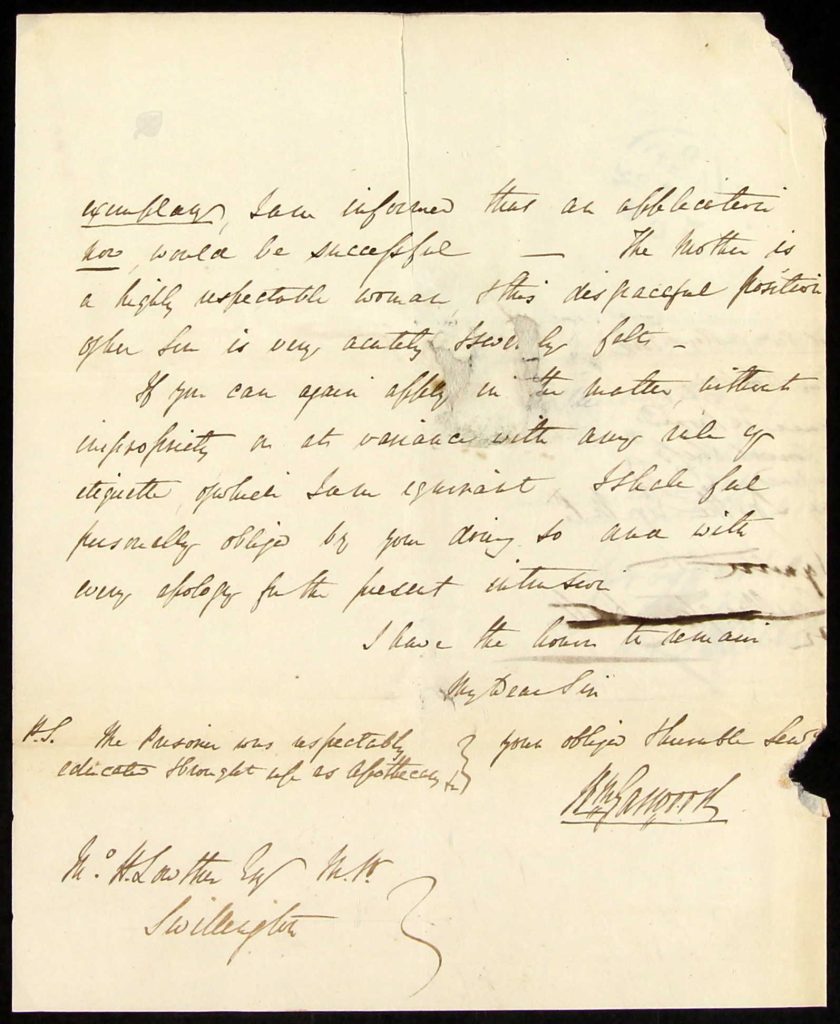
????, I am informed that an application now, would be successful __ The Mother is a highly respectable woman & this disgraceful position of her son is very acutely ??? felt _
If you can again apply in the mother without impropriety in at, variance with ??? ??? if etiquette of which I am ??? thankful personally obliged by your ??? to and with every apology for the present situation.
I have the hours to remain, My Dear Sir, You obliged Humble Servant,
Wm Garwood
P.S. The Prisoner was respectably educated ???? left as Apothecary
Sir H. Lowther Esq. M.P., Swillington
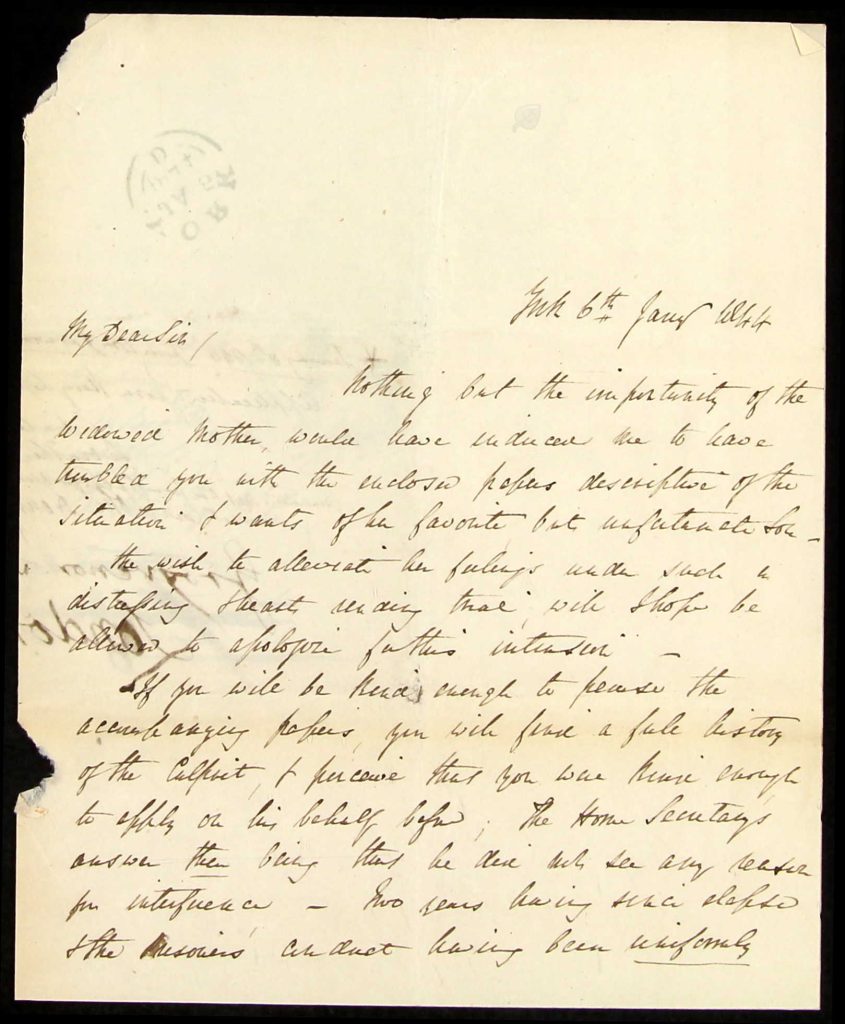
York, 6th Jan 1844
My Dearest,
Nothing but the importunity of the widowed Mother would have induced me to have trouble you with the enclosed papers descriptive of the situation if wants often favourite but unfortunate ??? the wish to alleviate her feelings under such a distressing the art reading that wish I hope be allowed to apologize for this initial??? _
If you will be kind enough to please the accompanying papers you will please a full history of the culprit I perceive that you were ??? enough to apply on his behalf before the Home Secretary’s answer then being that he ??? ??? see any leave for interference __ Two years having ??? elapsed and the widower’s conduct having been uniformally
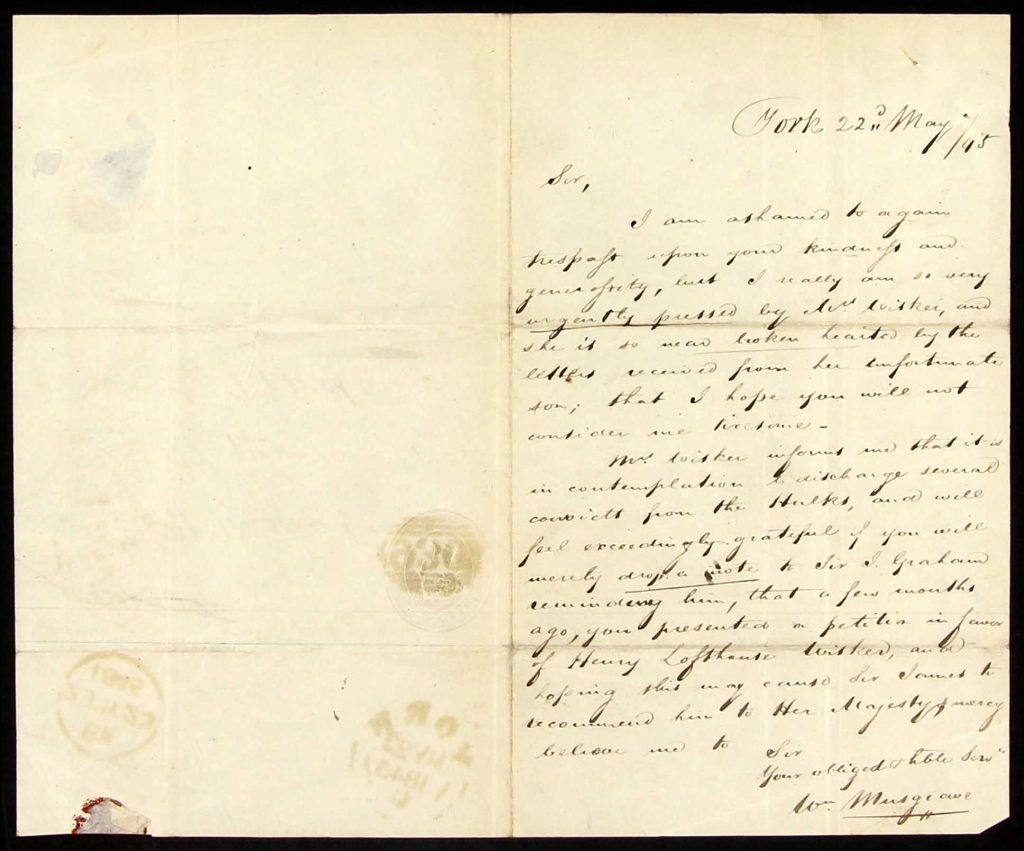
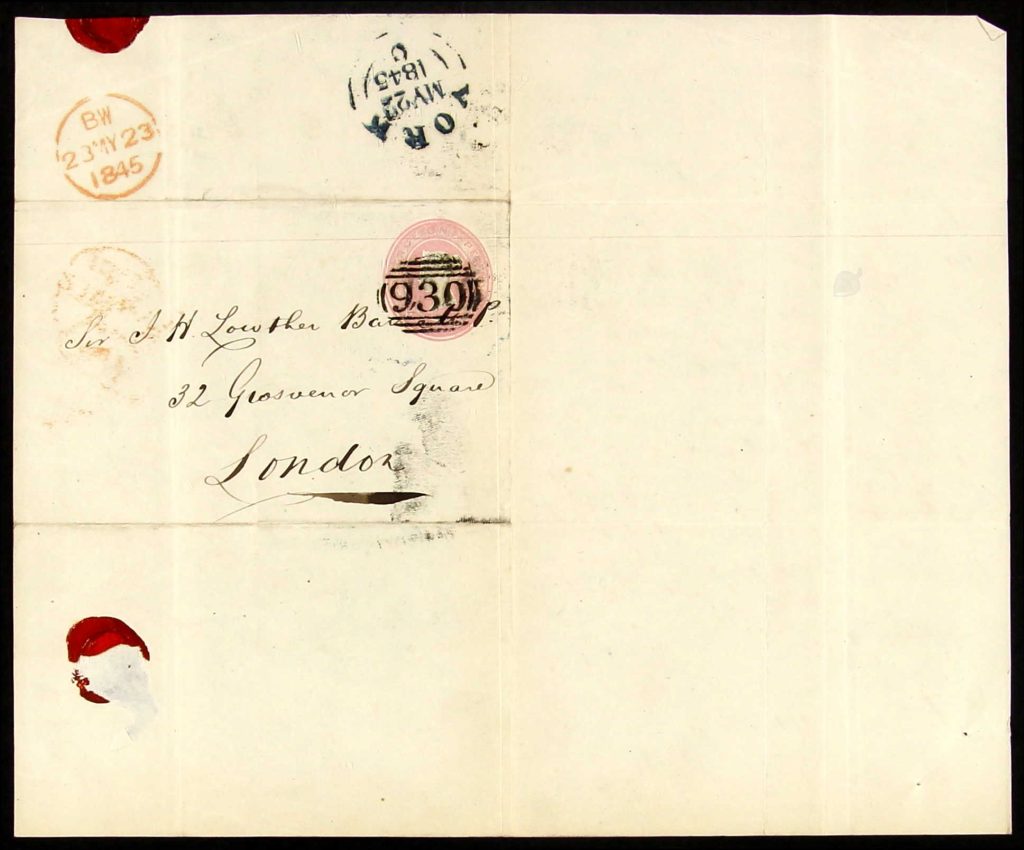
York 22nd May 1845
??? and to Sir,
Your obliged & humble Servant. Wm. Musgrave
Addressed to and stamped 23 May 1845
Sir J.H. Lowther Baronet
32 Grosvenor Square
London
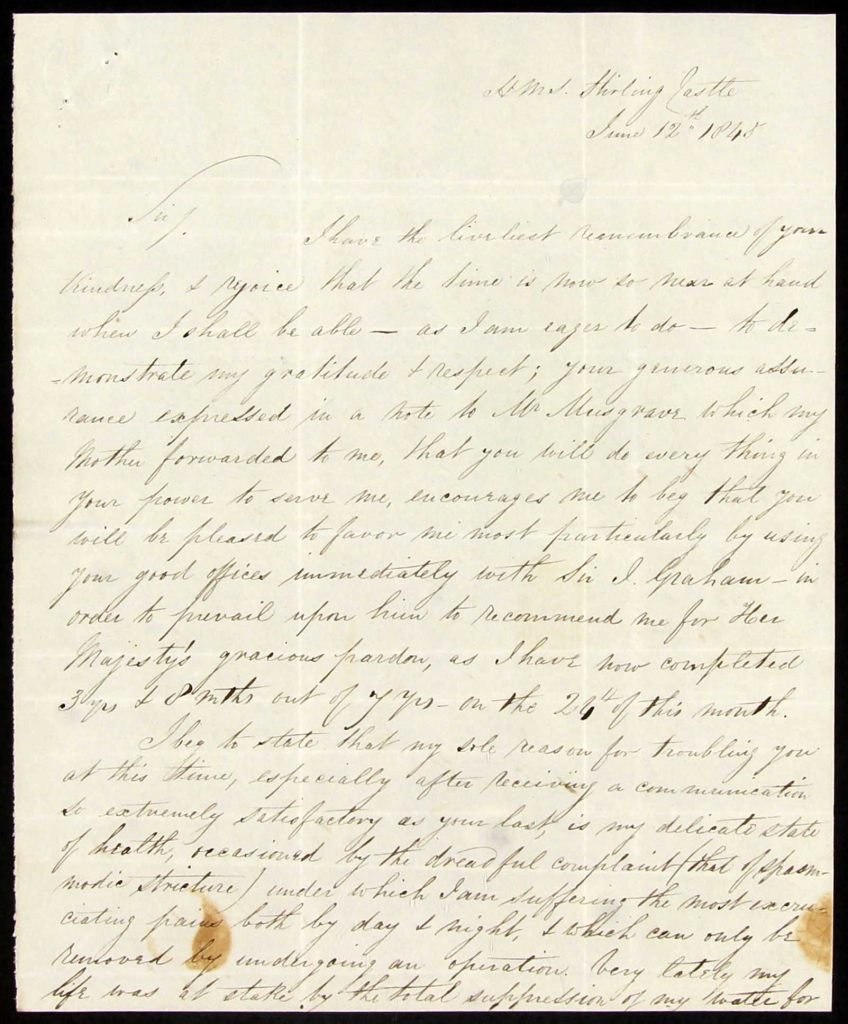
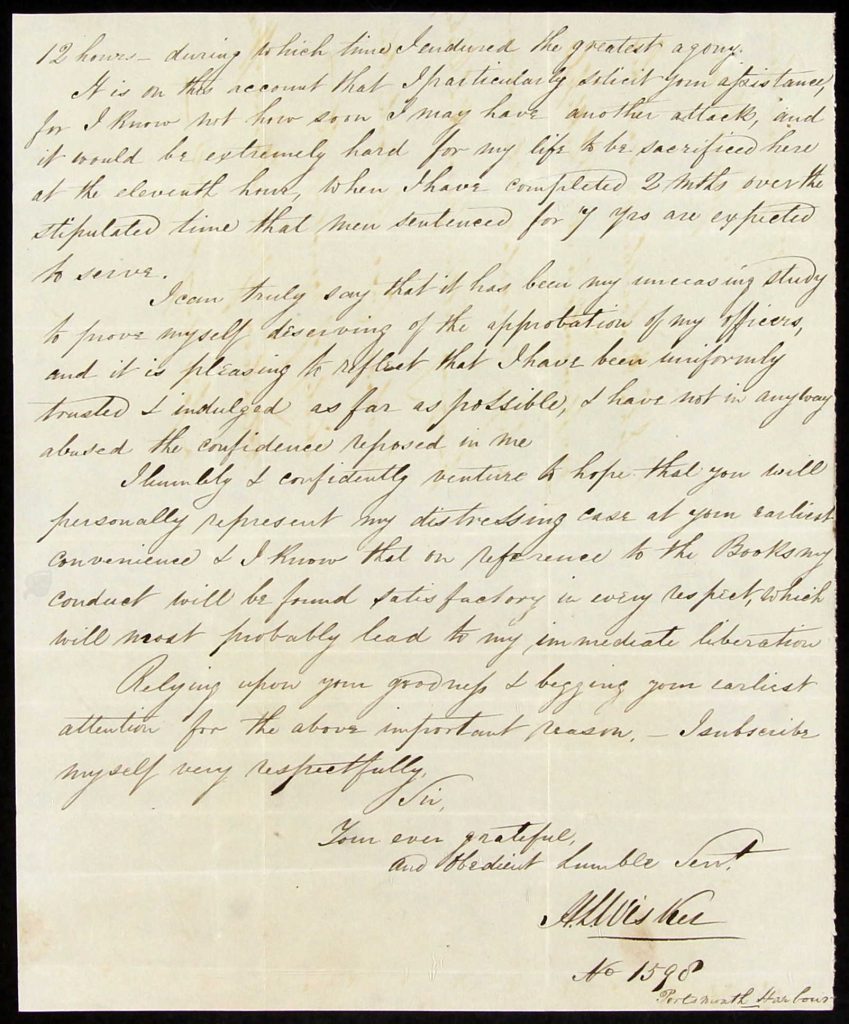
HMS Stirling Castle
June 12th 1845
Sir, I have the liveliest remembrance of your kindness & rejoice that the time is now so near at hand when I shall be able — as I am eager to do — to demonstrate my gratitude & respect; your generous assistance expressed in a note to Mr Musgrave which my Mother forwarded to me, that you will do every thing in your power to serve me, encourages me to beg that you will pleased to favor me most particularly by using your good offices immediately with Sir J. Graham __ in order to prevail upon him to recommend me for Her Majesty’s gracious pardon, as I have completed 3yrs & 8mths out of 7 yrs – on the 24th of this month.
I beg to state that my sole reason for troubling you at this time, especially after receiving a communication so extremely satisfactory as your last, is my delicate state of health, [sic] recasioned by the dreadful complaint (that of spasmodic stricture) under which I am suffering the most excruciating pains both by day & night, & which can only be removed by undergoing an operation. Very lately my life was at stake by the total suppression of my water for 12 hours__ during which kind I endured the greatest agony.
It is on this account that I particularly solicit your assistance, for I know not how soon I may have another attack, and it would be extremely hard for my life to be sacrificed here at the eleventh hour, when I have completed 2 months over the stipulated time that men sentenced for 7 yrs are expected to serve.
I can truly say that it has been my unceasing study to prove myself deserving of the approbation of my officers, and it is pleasing to reflect that I have been uniformly trusted & indulged as far as possible, I have not in anyway abused the confidence reposed in me.
I humbly & confidentially venture to hope that you will personally represent my distressing case at your earliest convenience & I know that on reference to the Books my conduct will be found satisfactory in every respect, which will most probably lead to my, immediate liberation.
Relying upon your goodness & begging your earliest attention for the above important reason, __ I subscribe myself very respectfully, Sir, Your ever grateful,
and obedient humble servant,
H.L.Wisker,
No. 1598, Portsmouth Harbour
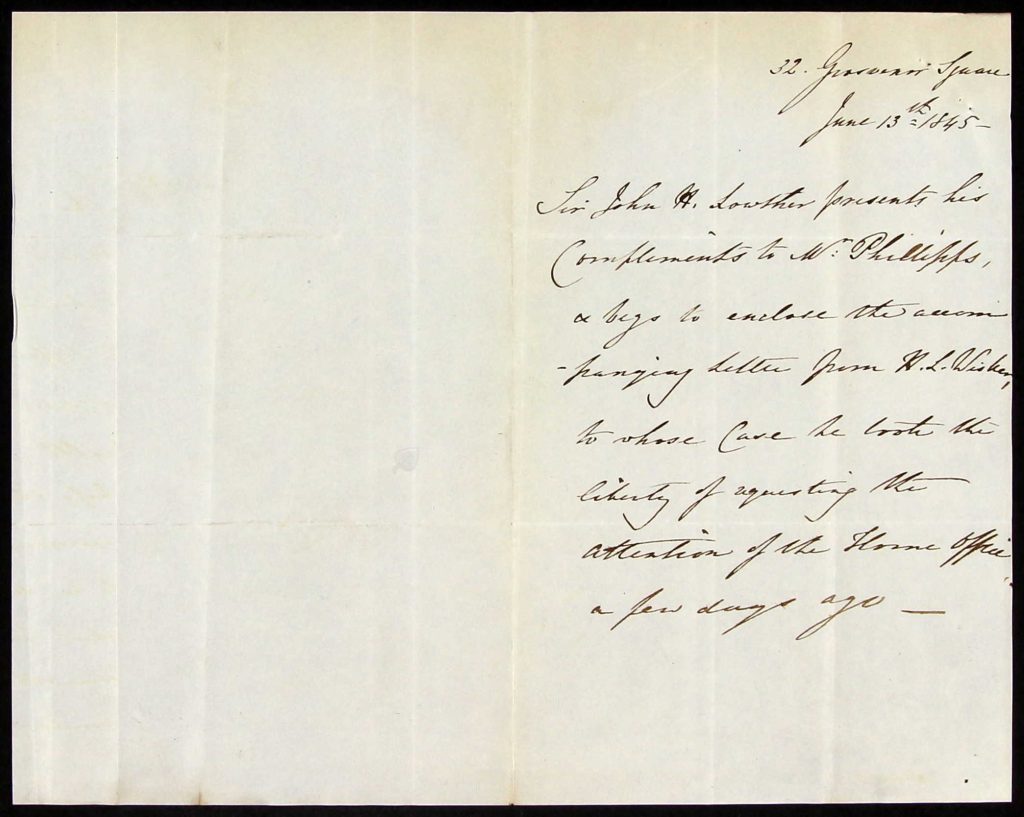
32 Grosvenor Square
June 13th, 1845
Sir John H Lowther presents his Compliments to Wm Phillipps, & begs to enclose the accompanying letter from H.L.Wisker, to whose Case he took the liberty of requesting the attention of the Home Office a few days ago__
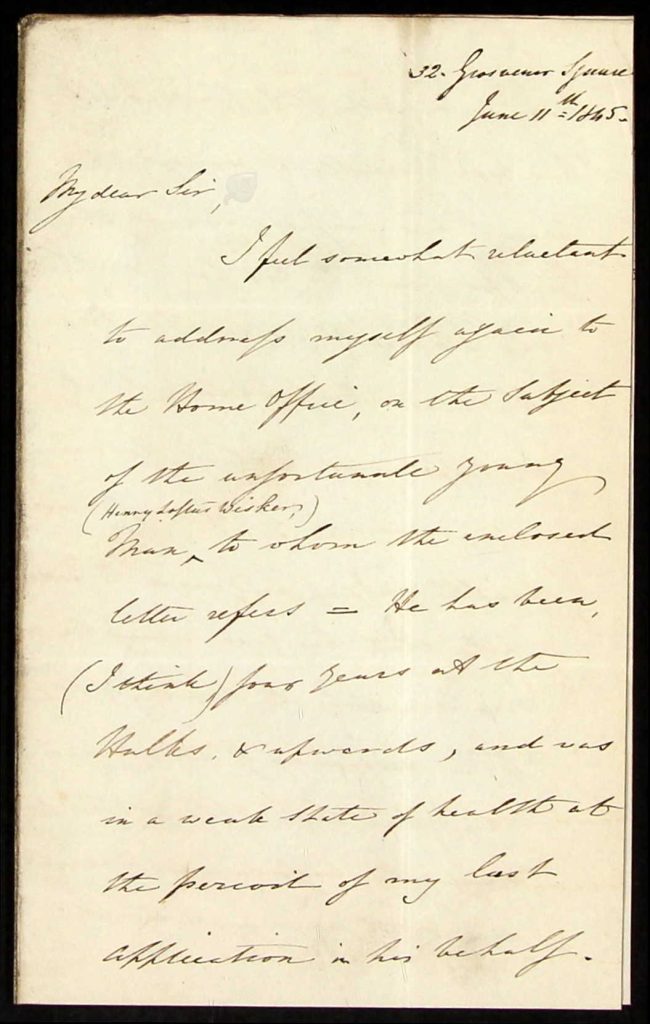
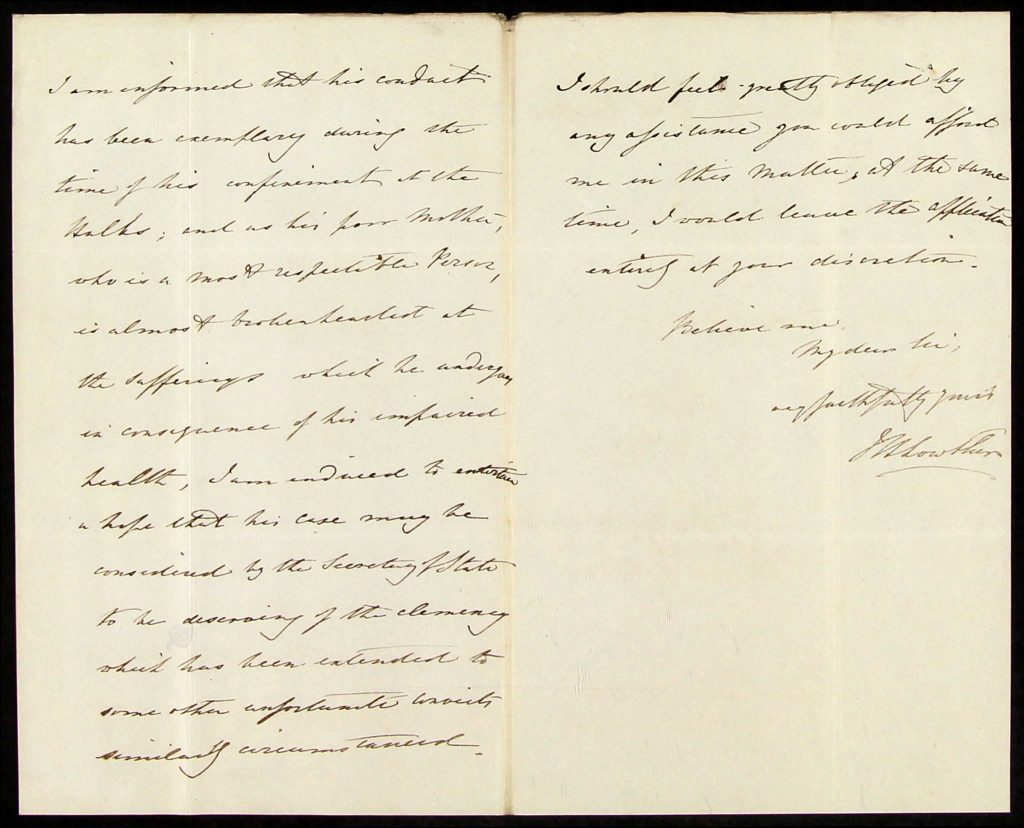
32 Grosvenor Square
June 11th, 1845
My Dear Sir, I feel somewhat reluctant to address myself again to the Home Office, on the subject of the unfortunate young man (Henry Loftus Wisker) to whom the enclosed letter refers = He has been, (I think) ??? ??? at the Hulks, & afterwards, and was in a weak state of health at the period of my last application in his behalf.
I am informed that his conduct has been exemplary during the time of his confinement at the Hulks, and as his poor Mother, who is a most respectable person is almost broken hearted at the sufferings which he endures in consequence of his impaired health, I am induced to entertain a hope that his case may be considered by the Secretary of State to the deserving of the clemency which has been extended to some other unfortunate convicts similarly ??? ???.
I should feel greatly asse?? by any assistance you could afford me in this matter. At the same time, I would leave the application ent??? at your discretion.
Believe me, My dear Sir, ??? faithfully yours,
M.L.Lowther
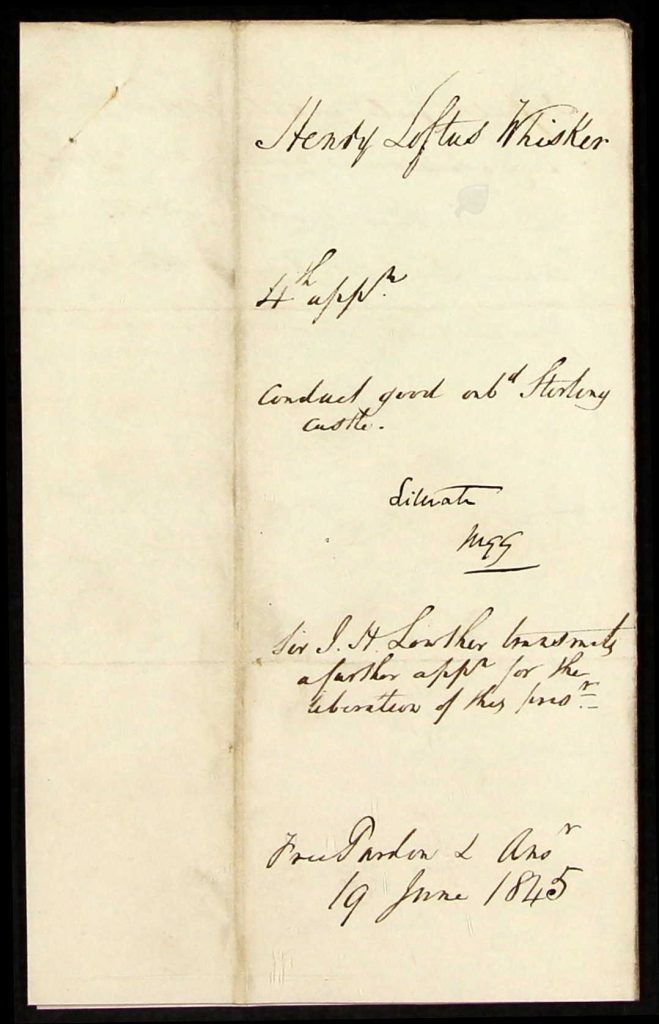
Henry Loftus Whisker
4th Application
Conduct good onboard Stirling Castle
???? MGG
Sir J. H. Lowther transmits a further application for the liberation of this pres.??
??? Pardon & Ansr
19 June 1845


*H. L. Wisker was convicted at the Central Criminal Court Old Bailey in the month of October 1841 of obtaining the sum of £20. the property of Mssr Block & Sons., Newgate Street London, by means of a fictitious order upon that firm and was there upon ordered to be transported for the term of seven years. —
Far from impugning the justice of the sentence passed upon me, but admit my culpability, but conceiving that considerable matter of mitigation was necessarily omitted in the evidence given in court in consequence of my voluntarily confessing my guilt, any previous conduct was upright and unmarked by any traits from which inherent depravity might be inferred. _ I am sorry & say that the unfortunate transaction for which I am at present suffering was committed while in a state of inebriety _ a fact which though it forms no justification of conduct so opposed to all my former habits and natural disposition. _ My intention was to have repaid the money I received on my return to York for the amount was trivial and my being personally well known to Messrs Block & Sons, I might have drawn a much larger sum had I entertained sinister designs on the property of those Gentlemen and as an additional confirmation of the strongassertion I make to you that the document by which the money was obtained purporting to be a letter from Mr G. P. Bainbridge (my Brother in Law) was so in??? as to offer every facility for a reimbursement of the prosecutors, which in all probability would have been effected had not I been unfortunate enough to become involved by yielding to the gaieties and dissipation for which London is proverbial and which held out such strong temptations to the inexperienced as to induce me to absent myself from home and conceal my embarrassments from my family from motives of shame.
I have been confined on board the Leviathan Hulk, Portsmouth, two years on the 24th October (this month) and my conduct has been in every respect satisfactory to the local authorities and in uniform compliance with the restrictions under which I am placed. I would like to state to you that I am really contrite for my error, I hope I have an opportunity of the ??? my prospects (which should my severe sentence be fully carried into operation) I must be utterly ruined, I hope you will consider that the punishment awarded me is under all circumstances adduced unusually severe for a first offense.__
I merely melo?? these few remarks, for your better ???. You will readily believe, to?? await with much anxiety, your reply to this as ?? condition is so painful as suspense._ My Mother will furnish you with more full ?portentous? of the answers, from, both Mr Lowther M.P.
& Mr Yorke M.P.
??? Sir from ?? ?? ?? H.L. Wisker
Please to cons??? thro? My Mother who will forward any communications to me_
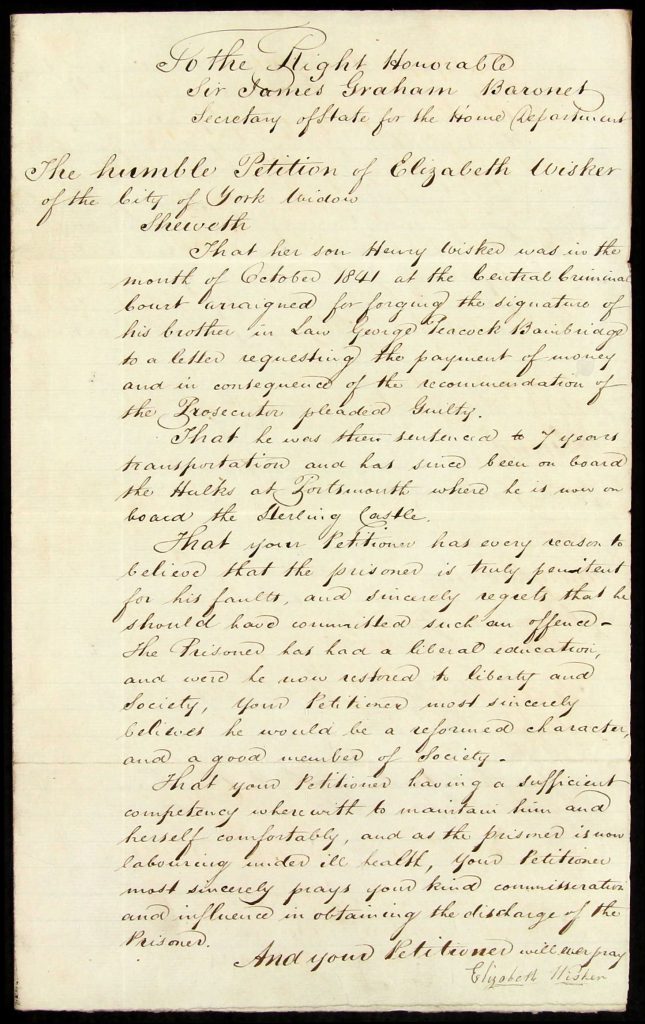
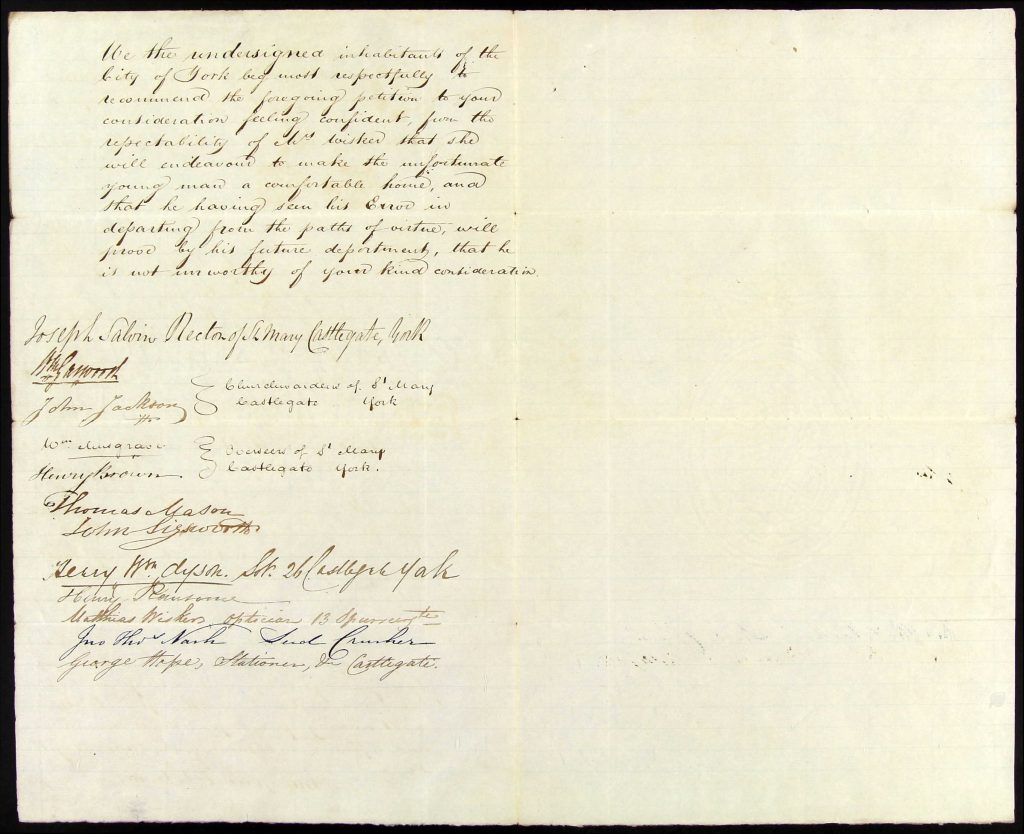
To the Right Honorable
Sir James Graham Baronet
Secretary of State for the Home Department
The humble Petition of Elizabeth Wisker of the City of York, Widow
I herewith
That her son Henry Wisker was in the month of October 1841 at the Central Criminal Court arraigned for forging the signature of his brother in law George Peacock Bainbridge to a letter requesting the payment of money and in consequence of the recommendation of the Prosecutor pleaded Guilty.
That he was then sentenced to 7 years transportation and has since been on board the Hulks at Portsmouth where he is now on board the Stirling Castle.
The your Petitioner has every reason to believe that the prisoner is truly penitent for his faults, and sincerely regrets that he should have committed such an offence_ the Prisoner has had a liberal education, and were he ever restored to liberty and Society, Your Petitioner most sincerely believes he would be a reformed character, and a good member of society.
That your Petitioner having a sufficient competency where with to maintain him and herself comfortably, and as the prisoner is now labouring under ill health, your Petitioner most sincerely prays your kind commiseration and influence in obtaining the discharge of the Prisoner.
And your Petitioner will ever pray, Elizabeth Wisker.
We the undersigned inhabitants of the City of York beg most respectfully to recommend the foregoing petition to your consideration feeling confident , from the respectability of Mrs Wisker that she will endeavour to make the unfortunate young man a comfortable home, and that he having seen his Error in departing from the paths of virtue, will prove by the future deportment, that he is not unworthy of your kind consideration.
Joseph Salvin Rector of St Mary Castlegate, York
Wm Gaworth }
John Jackson } Churchwardens of St Mary, Castlegate, York
Wm Musgrave }
Henry Brown } Overseers of St Mary, Castlegate, York
Thomas Mason
John Sigsworth
Henry Wm Dyson Sr, 26 Castlegate, York
Henry Hansome
Matthias Wisker, Optician, 13 Spurriergate
Jno Thos Nash, Seed Crusher (Mustard-Manufacturer)
George Hope, Stationer, Castlegate
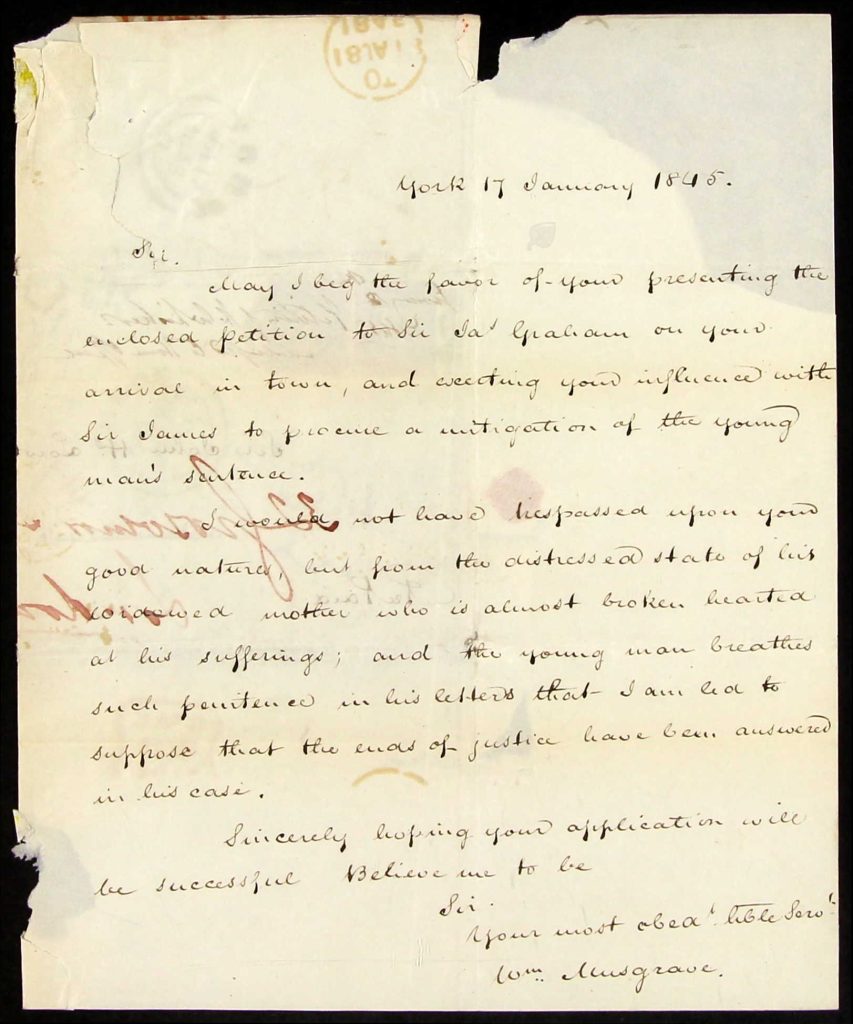
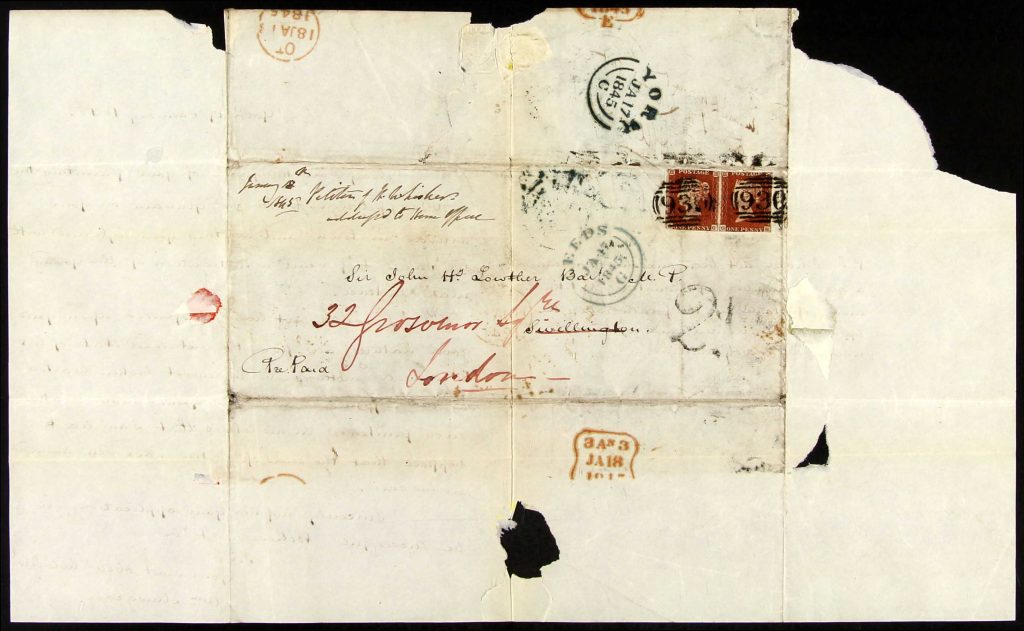
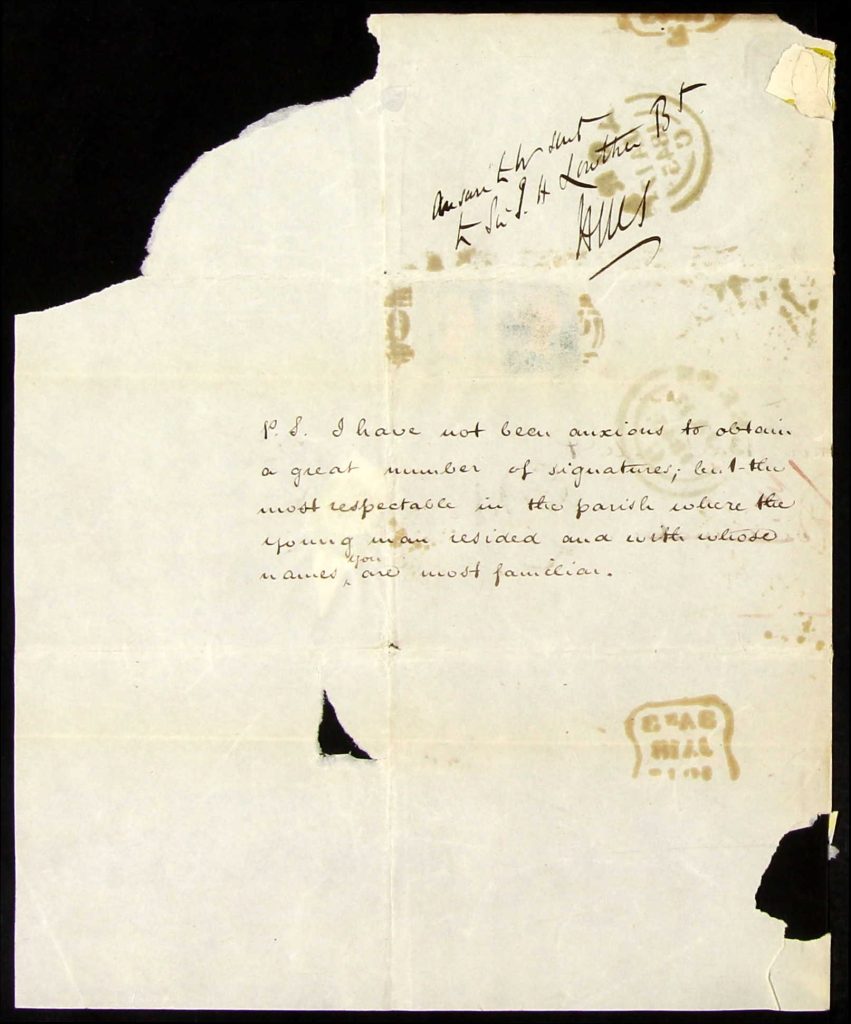
York 17 January 1845
Sir, May I beg the favour of your presenting the enclosed petition to Sir Jas Graham on your arrival in town, and enacting? your influence with Sir James to procure a mitigation of the young man’s sentence.
I would not have trespassed upon your good natures, but from the distressed state of his widowed mother who is almost broken hearted at his sufferings; and the young man breathes such penitence in his letters that I am ??? to suppose thar the ends of justice have been answered in his case.
Sincerely hoping your application will be successful. Believe me to be, Sir, your most obedient ??? Servant, Wm Musgrave.
Envelope: January 18 1845, Petition of H Wisker addressed to Home Office.
Sir John Hy Lowther, Baronet, M.P.Swillington 32 Grosvenor Square
London
Pre Paid.
?? E W ??
to Sir J H Lowther Baronet
HLKS?
PS I have not been anxious to obtain a great number of signatures; but the most respectable in the parish where the young man resided and with whose names you are most familiar.
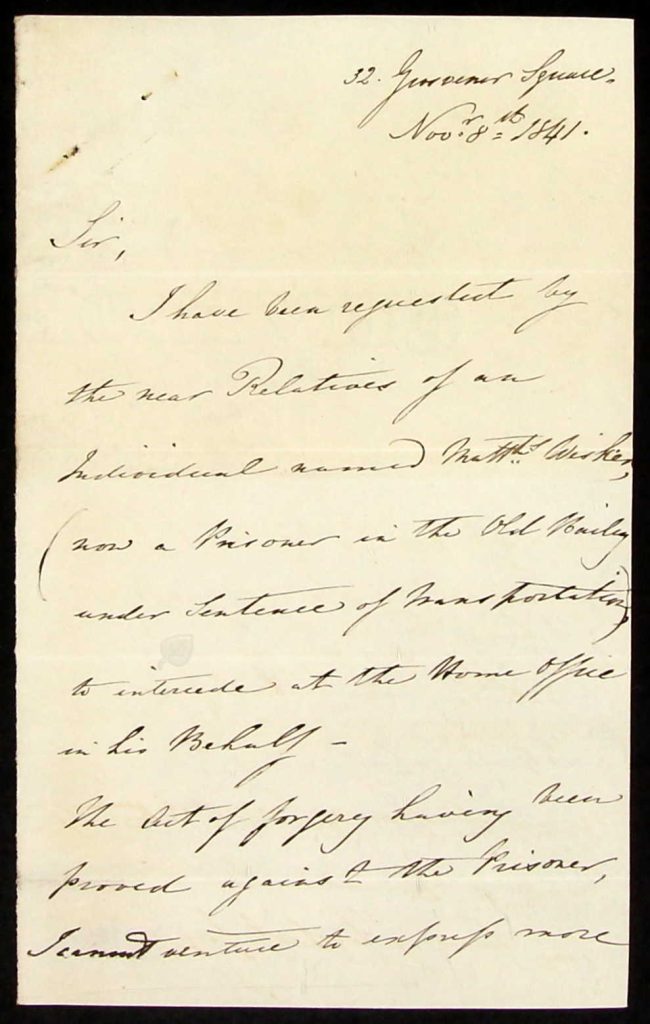
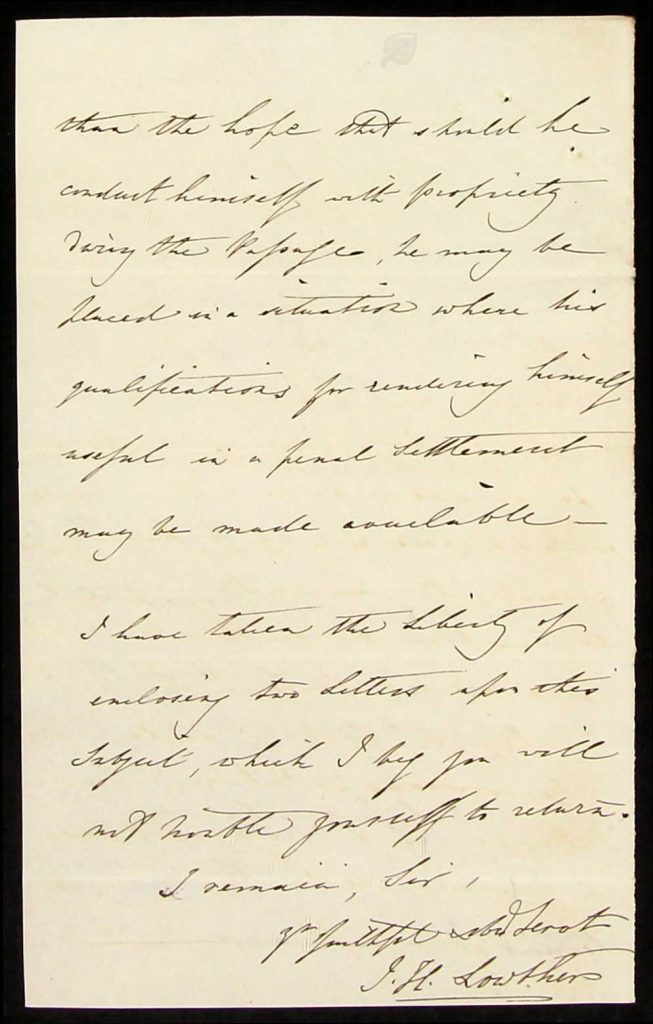
32 Grosvenor Square
November 8th 1841
Sir, I have been requested by the near Relatives of an Industrial? named Matthias Wisker, (now a Prisoner in the Old Bailey under sentence of transportation) to intercede at the Home Office on his Behalf.
The act of forgery having been proved against the Prisoner, I cannot venture to expect more than the hope that should he conduct himself with propriety during the passages?, he may be placed in a situation where his qualifications for rendering himself useful in a penal settlement may be made available.
I have taken the liberty of enclosing two letters upon the subject, which I hope you will not trouble yourself to return.
I remain, Sir, your faithful obedient servant, J.H. Lowther
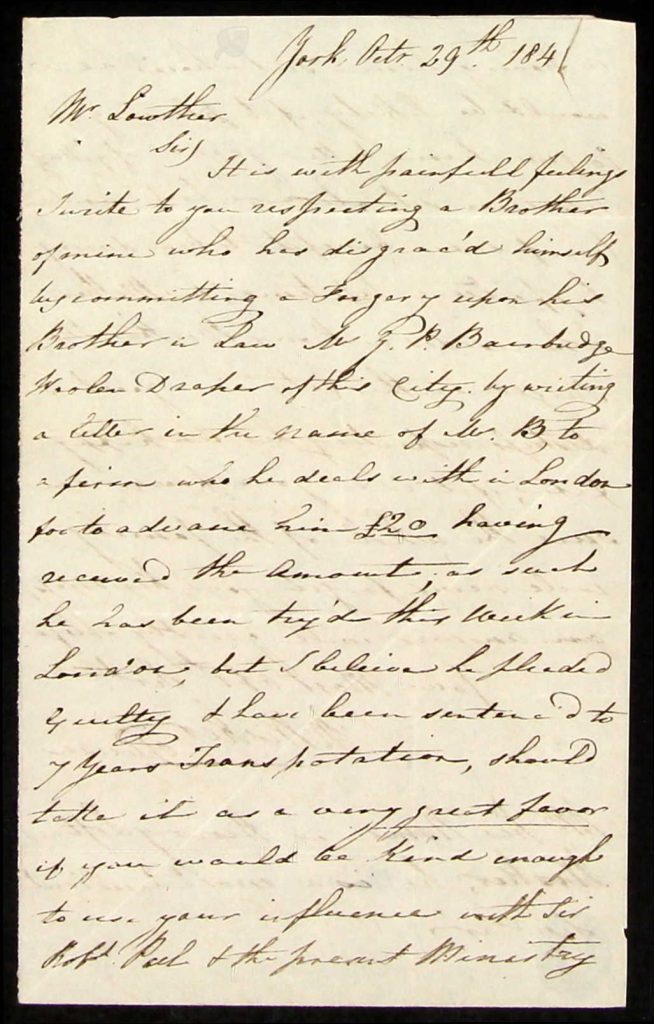
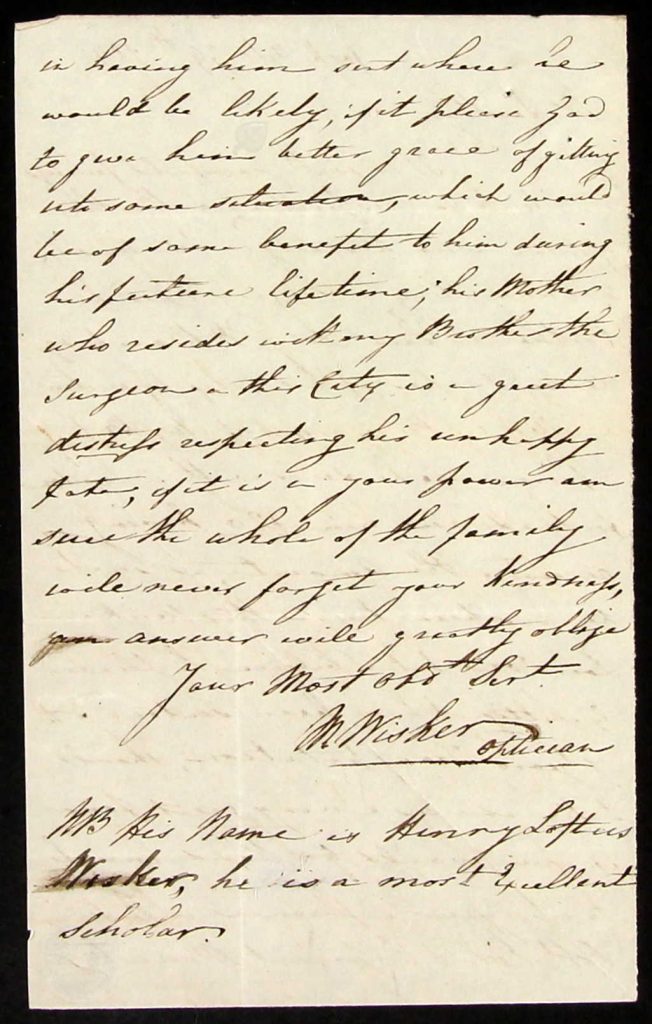
York, October 29th 1841
Mr Lowther
Sir,
It is with painful feelings I write to you respecting a Brother of mine who has disgraced himself by committing a forgery upon his Brother in Law Mr G P Bainbridge, Woolen Draper of this City by writing a letter in the name of Mr B, to a person who he deals with in London for to advance him £20 having secured the amount as such he has been tried this week in London, but I believe he pleaded Guilty & have been sentenced to 7 years Transportation, should take it as a very great favour if you would be kind enough to use your influence with Sir Robt Peel & the present Ministry in having him out where he would be likely if it please you to give him better grace of getting into some situation, which would be of some benefit to him during his sentence lifetime, his Mother who resides with my Brother–the Surgeon in this City is in great distress respecting his unhappy fate, if it is in your favour am seize the whole of the family ??? never forget your kindness and answer will greatly obliged.
Your Most Obedient Servant
M Wisker, Optician
NB His Name is Henry Loftus Wisker he is a most excellent scholar.
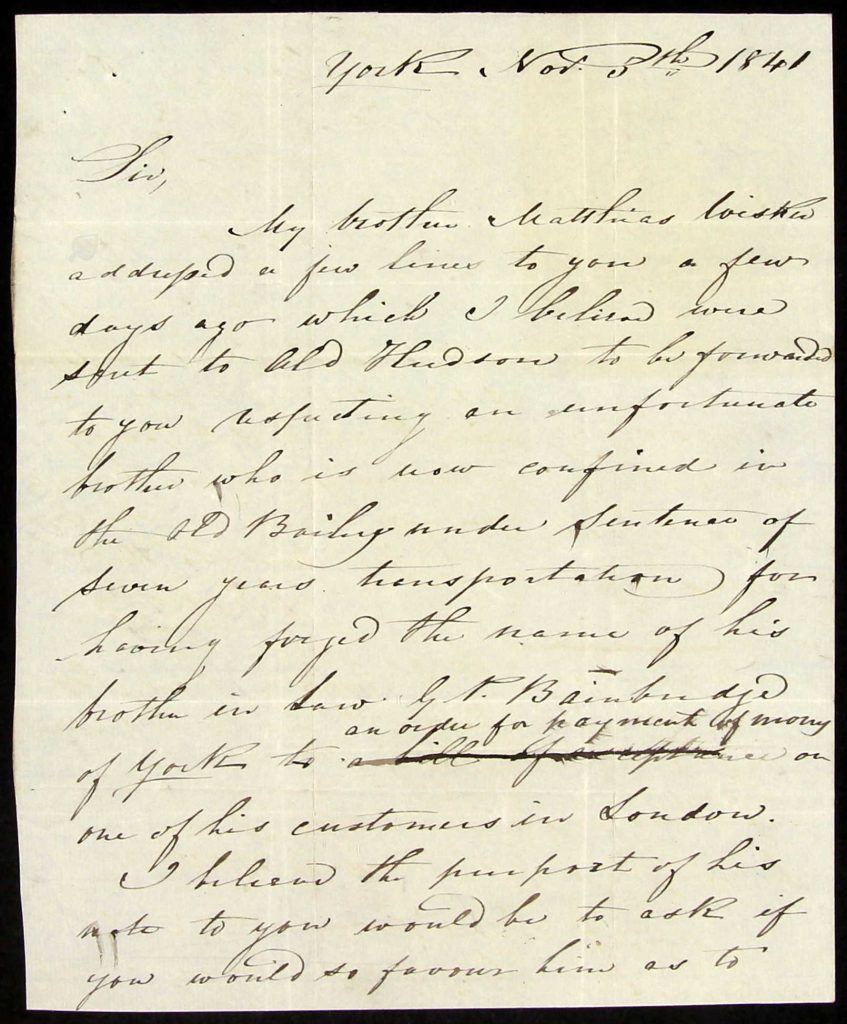
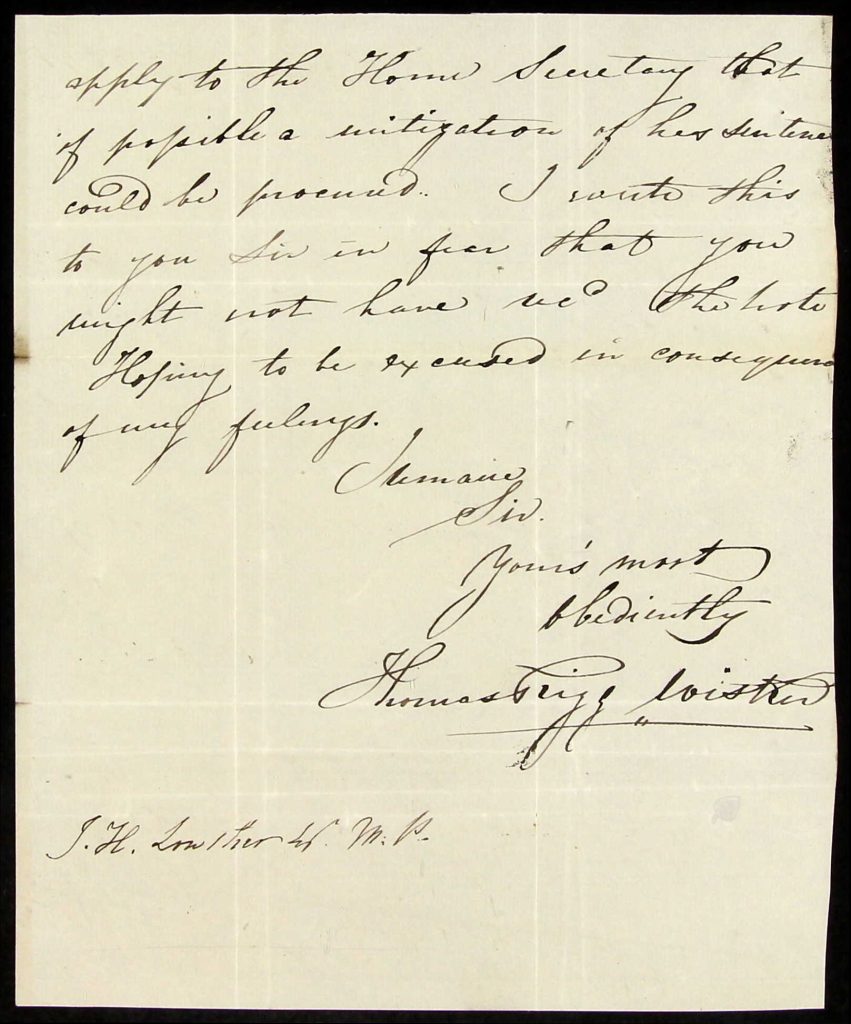
York, November 5th 1841
Sir,
My brother Matthias Wisker addressed a few lines to you a few days ago which I believed were sent to Old Hudson to be forwarded to you respecting an unfortunate brother who is now confined in the Old Bailey under sentence of Seven years transportation for having forged the name of his brother in law G. P. Bainbridge of York to an order for payment of money on one of his customers in London.
I believed the purport of his ?? to your would be to ask if you would so favour him as to apply to the Home Secretary that of possible a mitigation of his sentence could be procured. I write this to you Sir in fi?? that yo might not have received the note.
Hoping to be execused in consequence of my feelings.
I ???
Sir
Yours most obediently
Thomas Rigg Wisker
J.H. Lowther, Baronet, M.P.
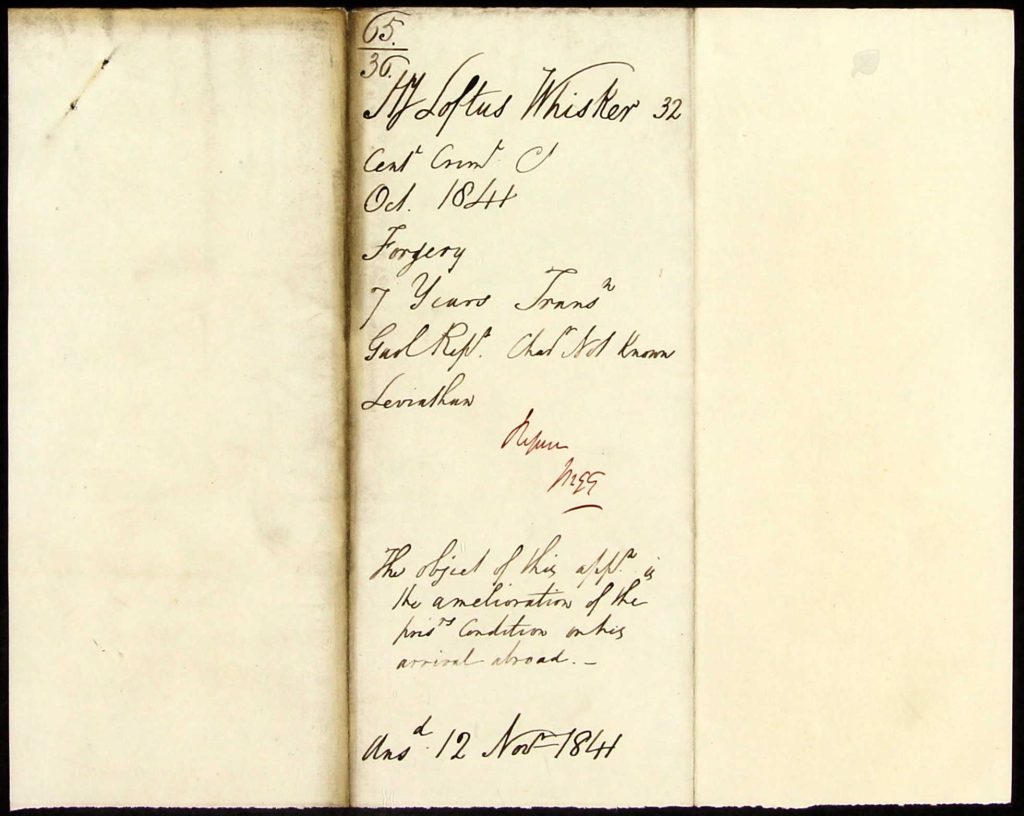
65/36
Hy Loftus Whisker 32
Central Criminal Court
Oct 1844
Forgery
7 Years Transportation
Gaol Report: Character Not Known
Leviathan
??? ???
The object of this application is the amelioration of the prisoners condition on his arrival abroad._
Answered 12th November 1841


Pardon 28 July 1845, UK, Criminal Records, 1780-1871for Hy Loftus Wisker
Web References
References
- Our Criminal Ancestors, Victoria Dawson, Helen Johnston and Heather Shore of the Our Criminal Ancestors Project, University of Hull
- Penal Transportation, Wikipedia
- List of Australian penal colonies, Wikipedia
- Stain or badge of honour? Convict heritage inspires mixed feelings, 7 Jun 2015, The Conversation
- Henry Wisker, Insolvency Court, Yorkshire Gazette – Saturday 15 Nov 1834, The British Newspaper Archive
- Henry Wisker, Insolvency Court, The London Gazette, 11 Nov 1834, Google Books
- Video tour: York’s restored Guildhall, complete with café, restaurant – and secret staircase, 21 Apr 2022, YorkMix
- York Guildhall, Wikipedia
- Map of York 1852, InteractiveMaps.uk
- Prisoner name: Henry Loftus Wisker, aged 32. Court and Date of Trial: Central Criminal… The National Archives
- Guildhall, Henry Loftus Wisker, Morning Herald (London) – Friday 15th Oct 1841, The British Newspaper Archive
- Police. Guildhall, Henry Loftus Wisker, Globe – Friday 15th Oct 1841, The British Newspaper Archive
- Police. Guildhall, Henry Loftus Wisker, Morning Herald (London) – Friday 15 Oct 1841, The British Newspaper Archive
- Forgery, Henry Loftus Wisker, The Evening Chronicle 15 Oct 1841, The British Newspaper Archive
- Guildhall, Henry Loftus Wisker, The Morning Chronicle 16th Oct 1841, The British Newspaper Archive
- Guildhall, Henry Loftus Wisker, English Chronicle and Whitehall Evening Post – Saturday 16 Oct 1841, The British Newspaper Archive
- Guildhall, Henry Loftus Wisker and Mail Seal, Morning Advertiser – Saturday 16 Oct 1841, The British Newspaper Archive
- Henry Wisker, Deception: fraud. Pleaded guilty. Transportation, 25 Oct 1841, The Proceedings of the Old Bailey
- Case 2597. Henry Wisker, Proceedings of the Central Criminal Court, 25th Oct 1841, page 44, Old Bailey Online
- Henry Wisker, Old Bailey Proceedings, 25th Oct 1841, Old Bailey Online
- Henry Wisker, Court Records, Digital Panopticon
- Henry Wisker, Transportation for seven years, The Morning Post, 1 Nov 1841, The British Newspaper Archive
- Henry Wisker, Transportation for seven years, The Morning Chronicle, 1 Nov 1841, The British Newspaper Archive
- Sessional Results, For Seven Years–Henry Wisker, Old England – Monday 8 Nov 1841, The British Newspaper Archive
- Free Settler or Felon, Prison Hulk Report, 1838, freesettlerorfelon.com
- The Adventures of Ralph Rashleigh, A Penile Exile in Australia, 1825-1844, by James Tucker. Published by Jonathan Cape, London 1929
- Leviathan Prison Hulk, A Convict Life, Brooke Wooldridge, 9 May 2019, www.brookewooldridge.com
- Frederick Roff, Transportation for fourteen years, Morning Advertiser, 5 Apr 1842, The British Newspaper Archive
- List of British prison hulks, Wikipedia
- HMS Leviathan (1790), Prison Hulk, Wikipedia
- HMS Leviathan, Prison History
- HMS Stirling Castle (1811), Prison Hulk, Wikipedia
- HMS Stirling Castle, Prison History
- Prison Hulk, HMS Stirling Castle, Oil on Canvas Painting by William B. Jenner, Artnet
- ‘A floating Hell’: life on early 19th century convict hulks, 1 Sep 2015, Briony Paxman, National Archives
- John Henry LOWTHER (1793-1868), of Swillington, Yorkshire, The History of Parliament
- Sir James Robert George Graham, 2nd Baronet, Home Secretary and First Lord of the Admiralty, Wikipedia
- Baptism Records, Burial Registers, and 1851 Census Data, York Family History Society






Updated article to include Elizabeth Wisker né Rigg’s death in Feasegate, York, in 1854. Thereby removing one mystery and leaving just the disappearance of Henry Loftus Wisker to resolve. All credit to the York Family History Society.
Digging for Britain unearth skeletons on Rat Island in Portsmouth Harbour. These are the victims of the prison hulk’s over crowding, atrocious hygiene, rampant disease, and poor diets. Relevant chapter starts at 24:30
https://youtu.be/FA9Mlo1Jabk?t=1470